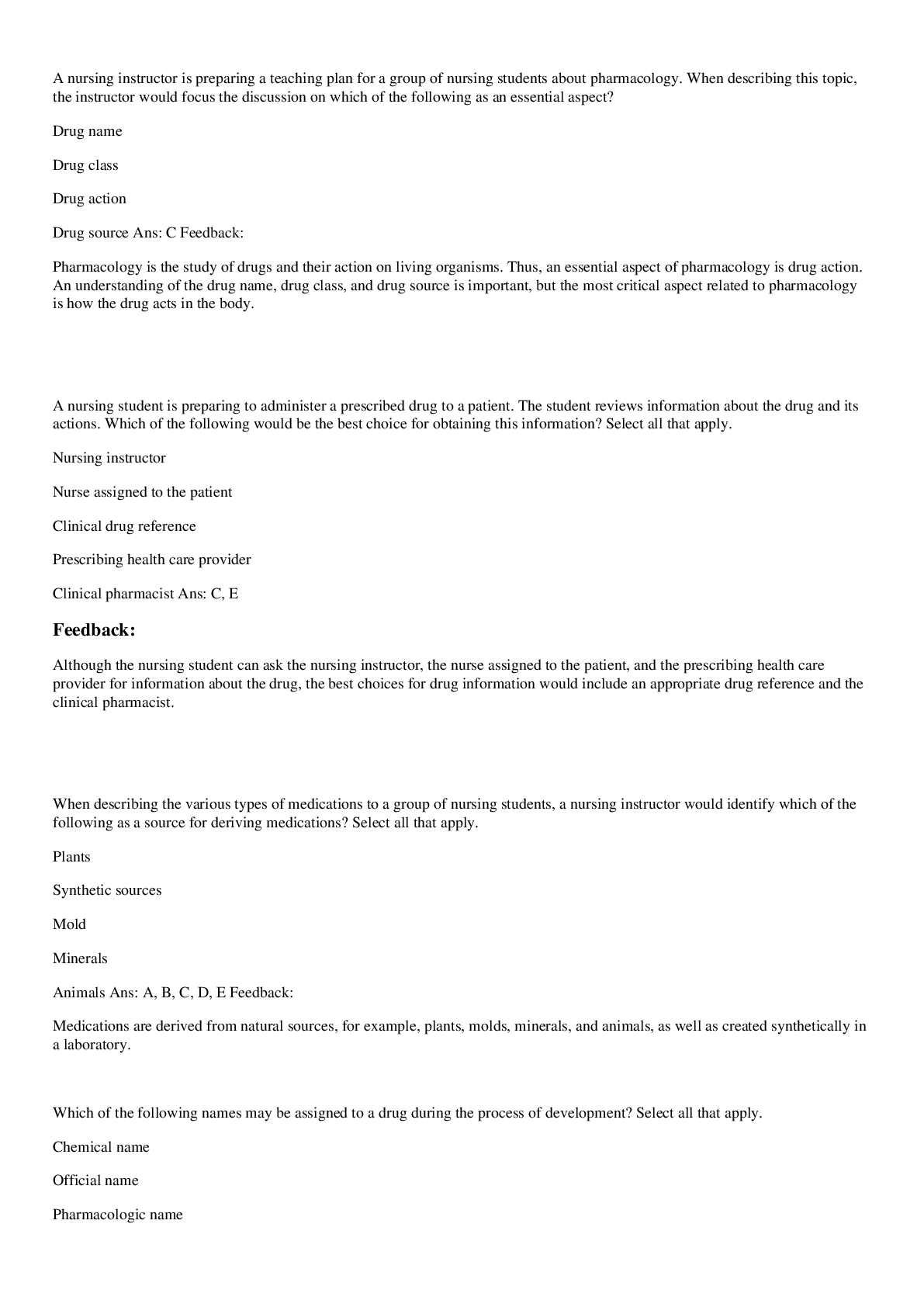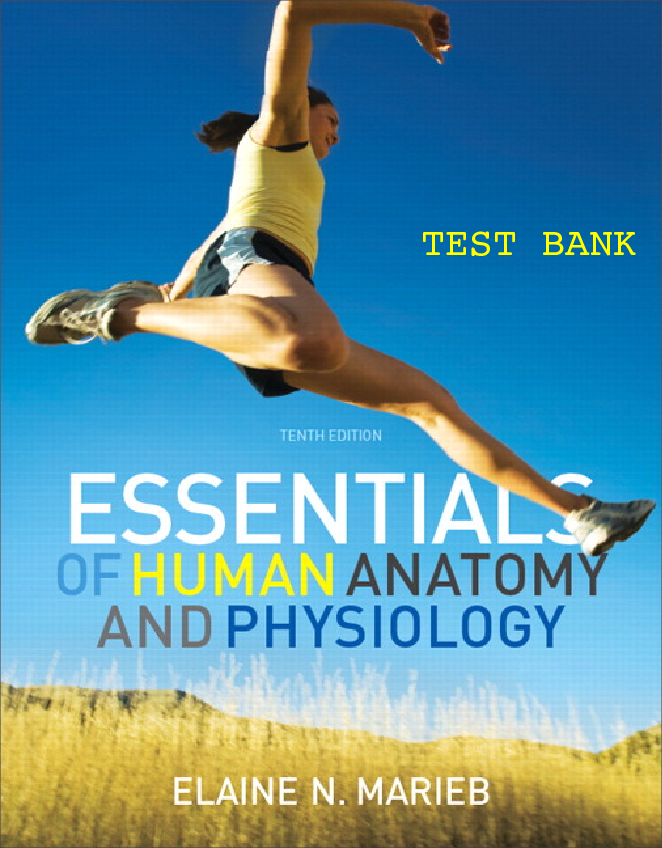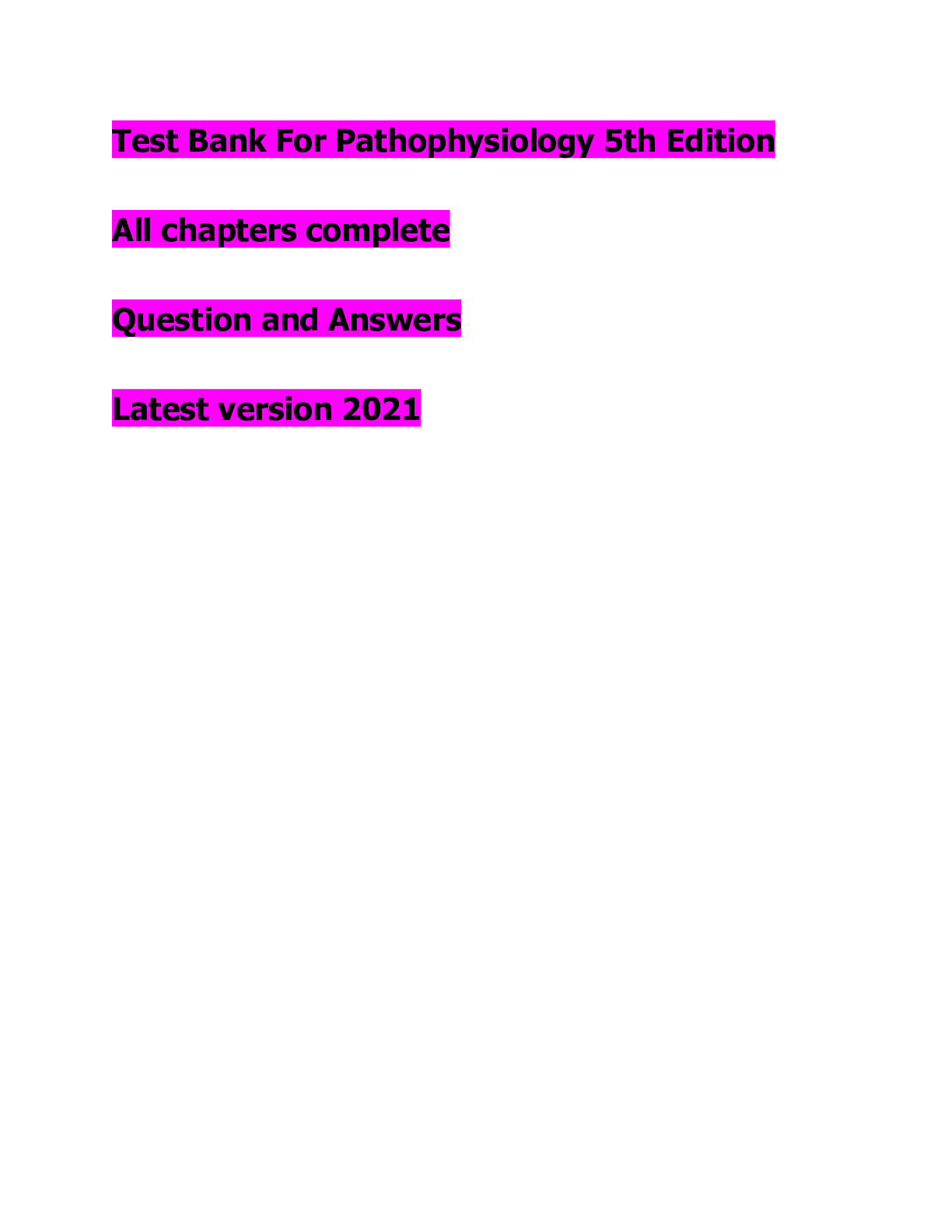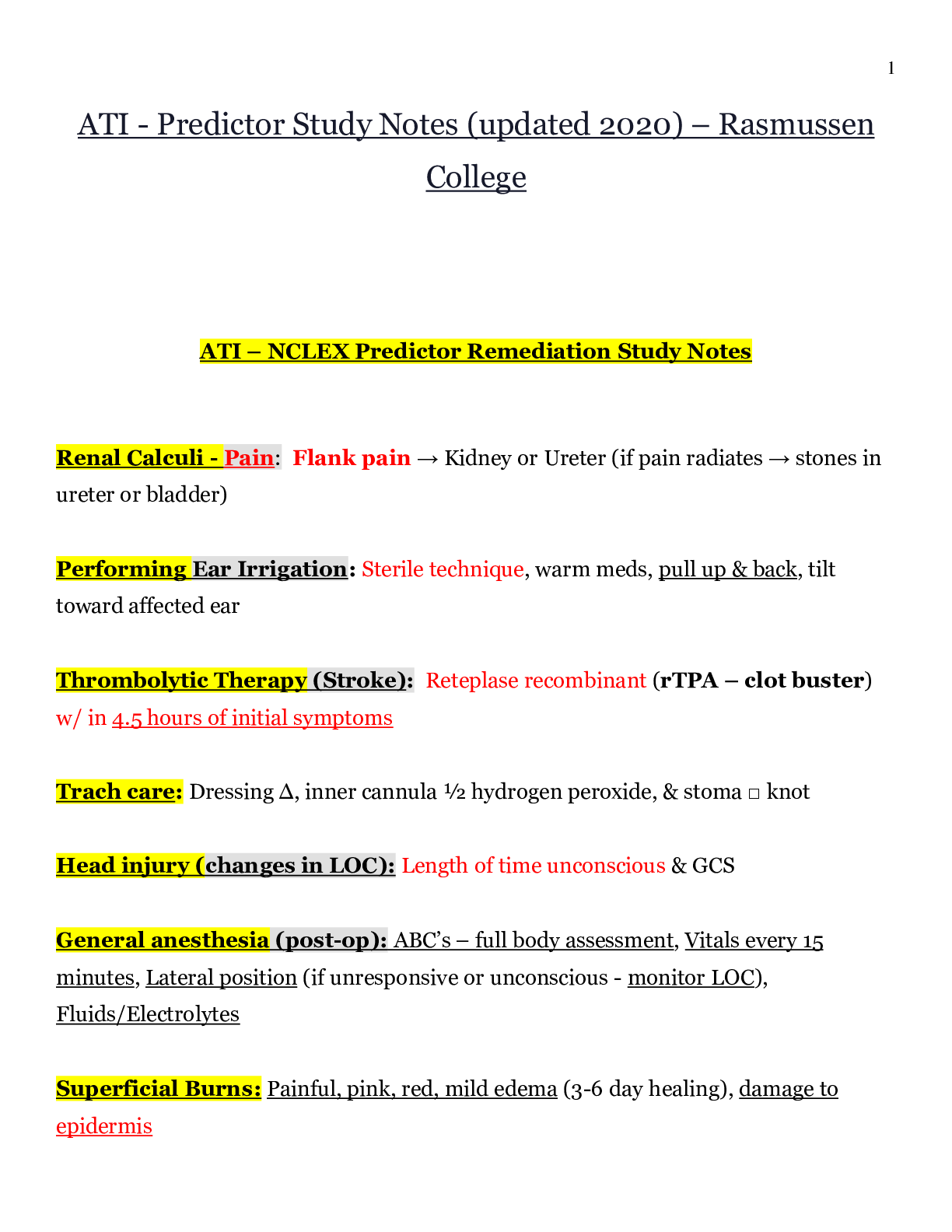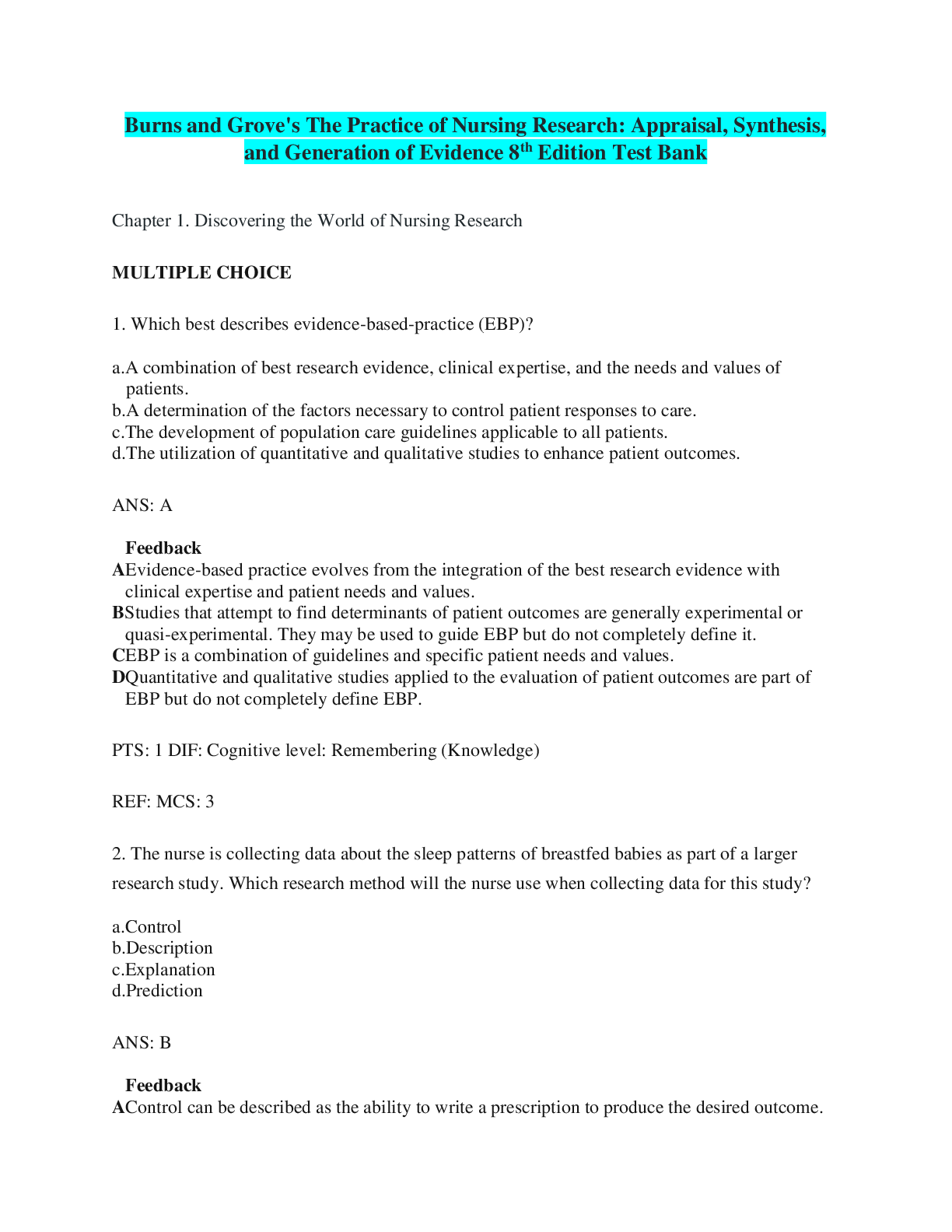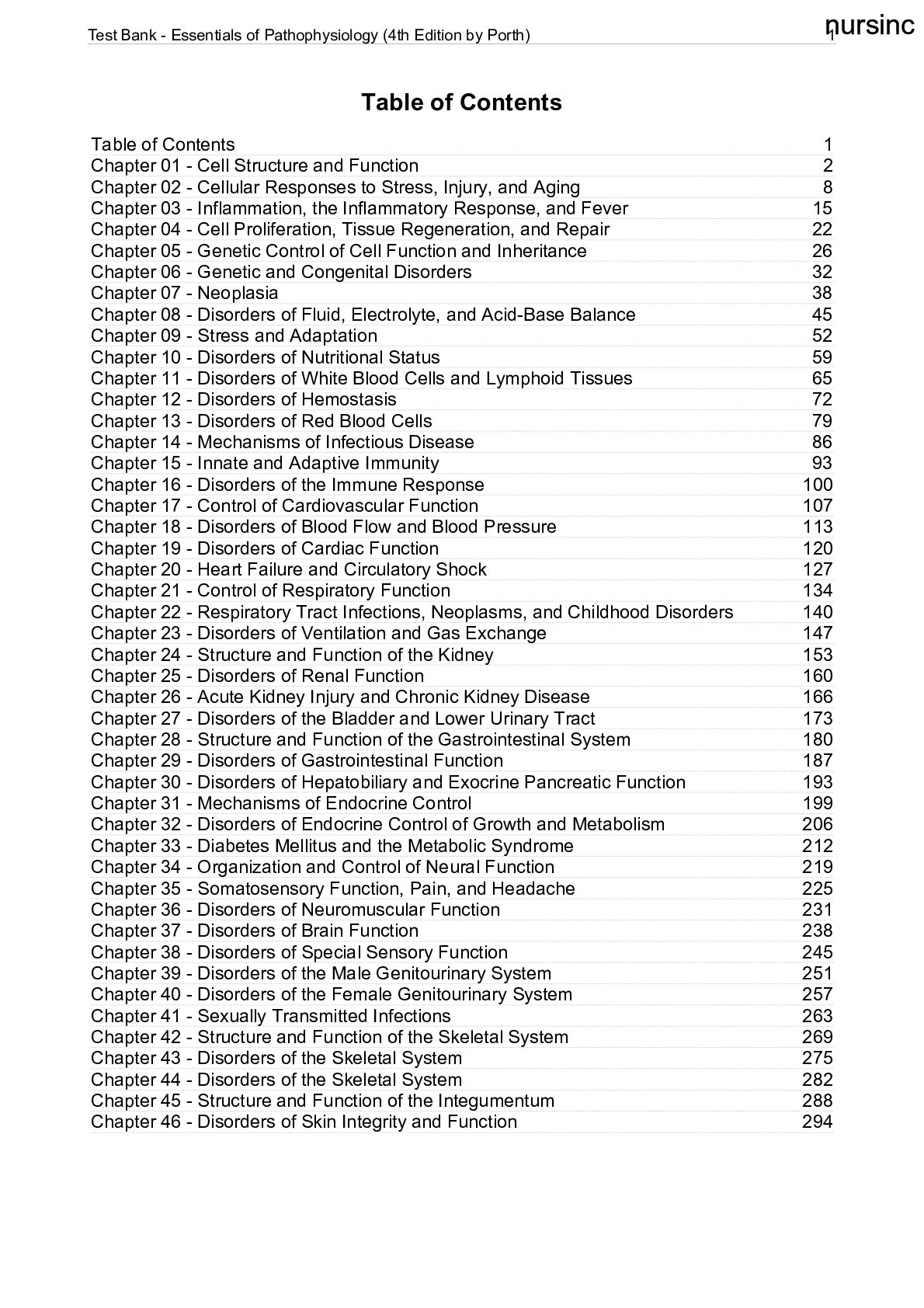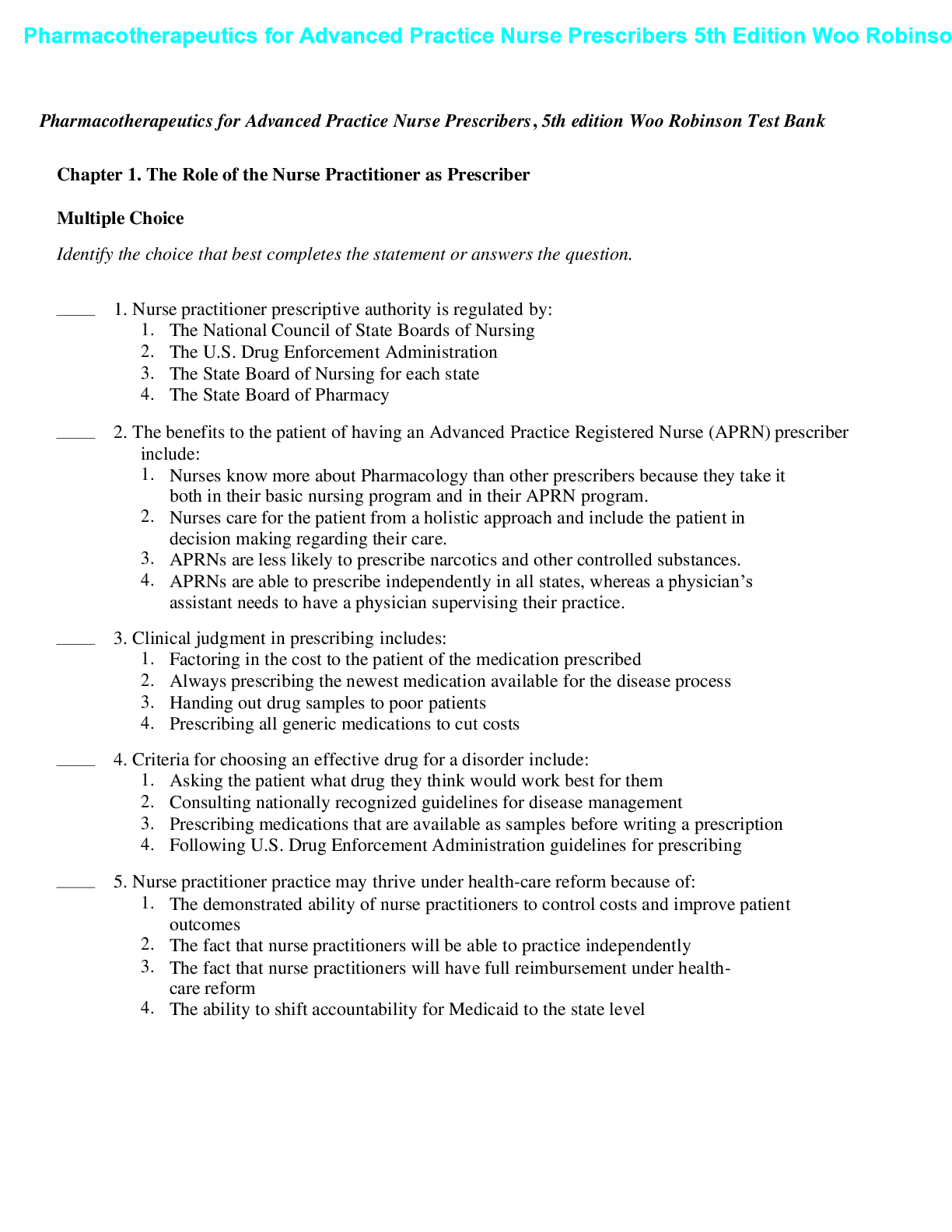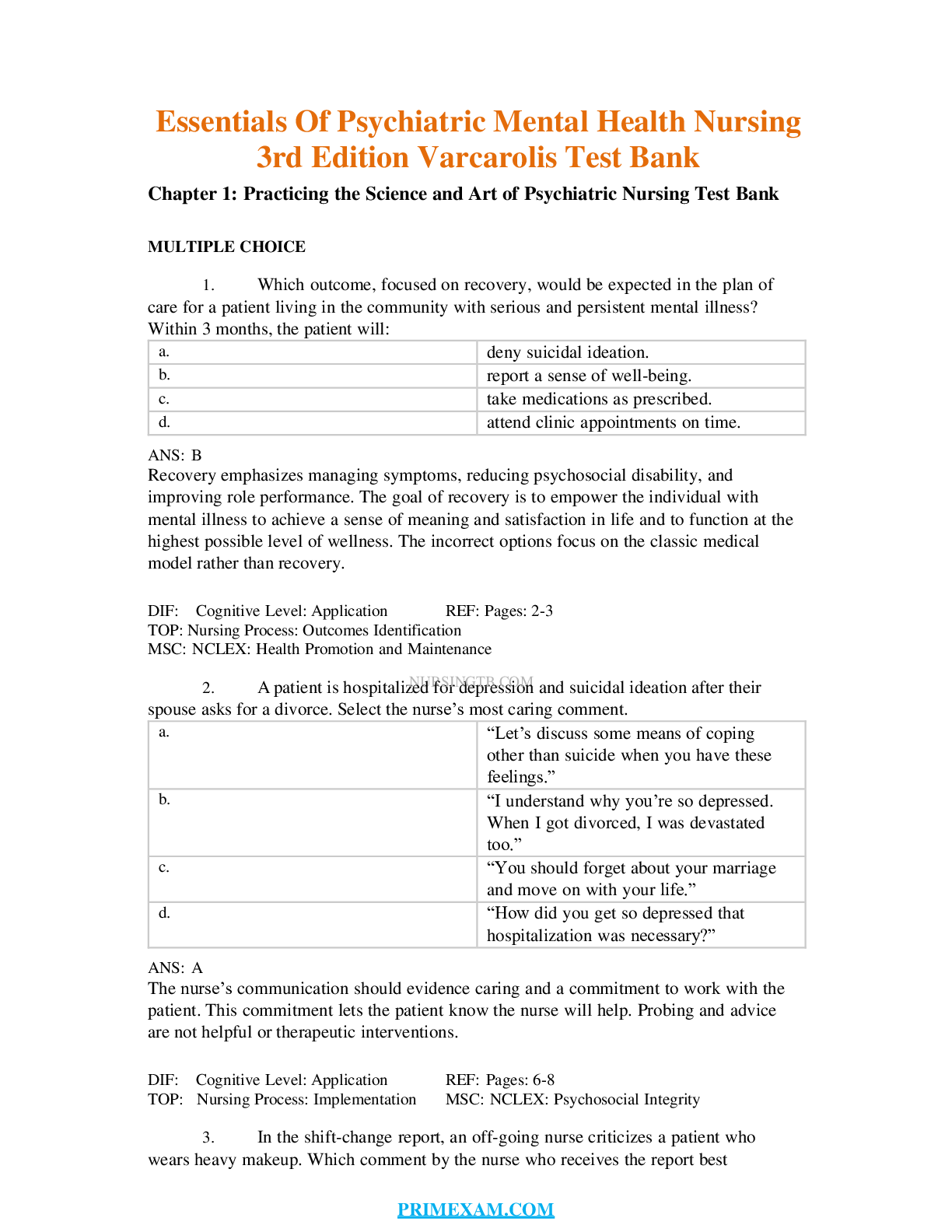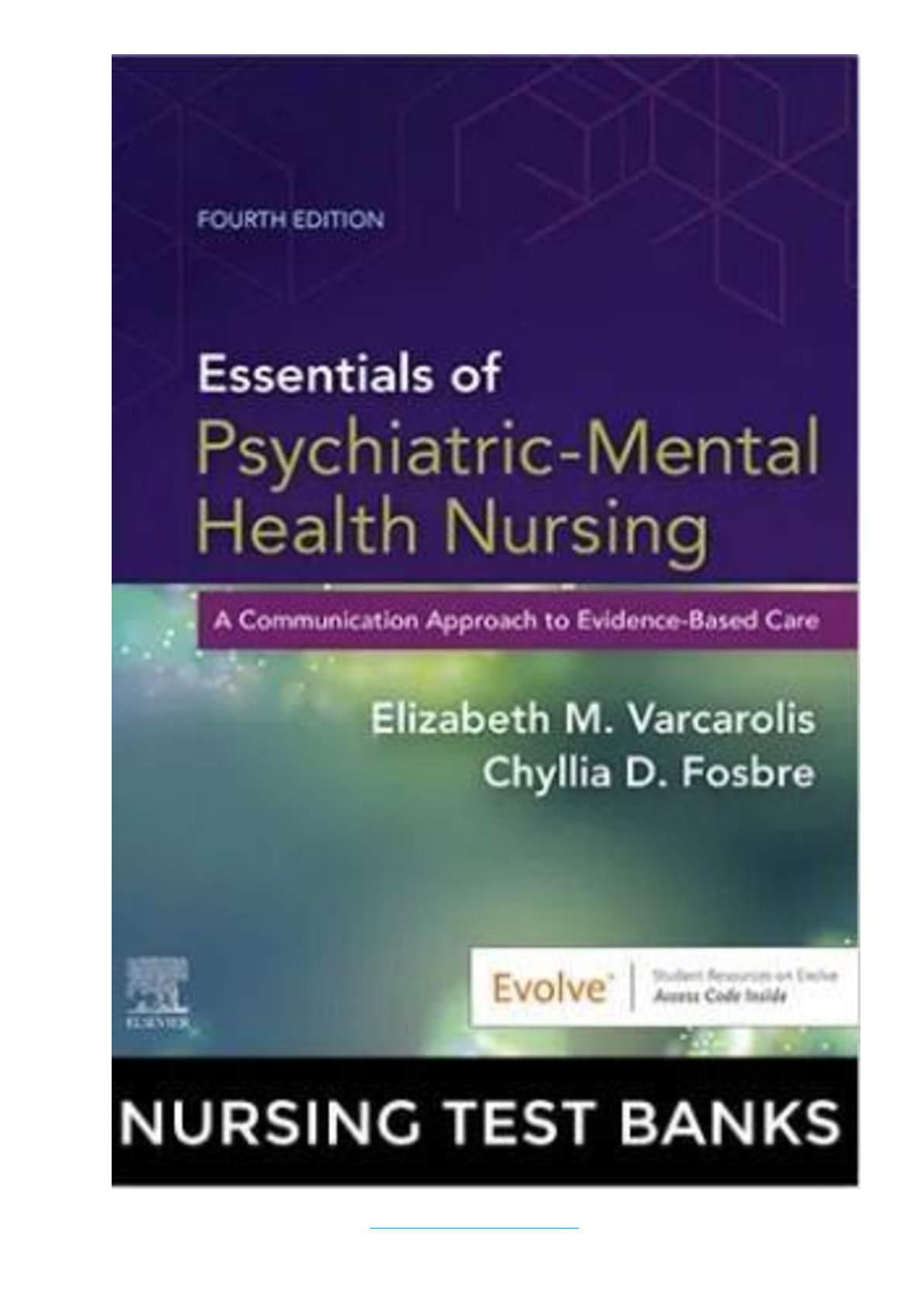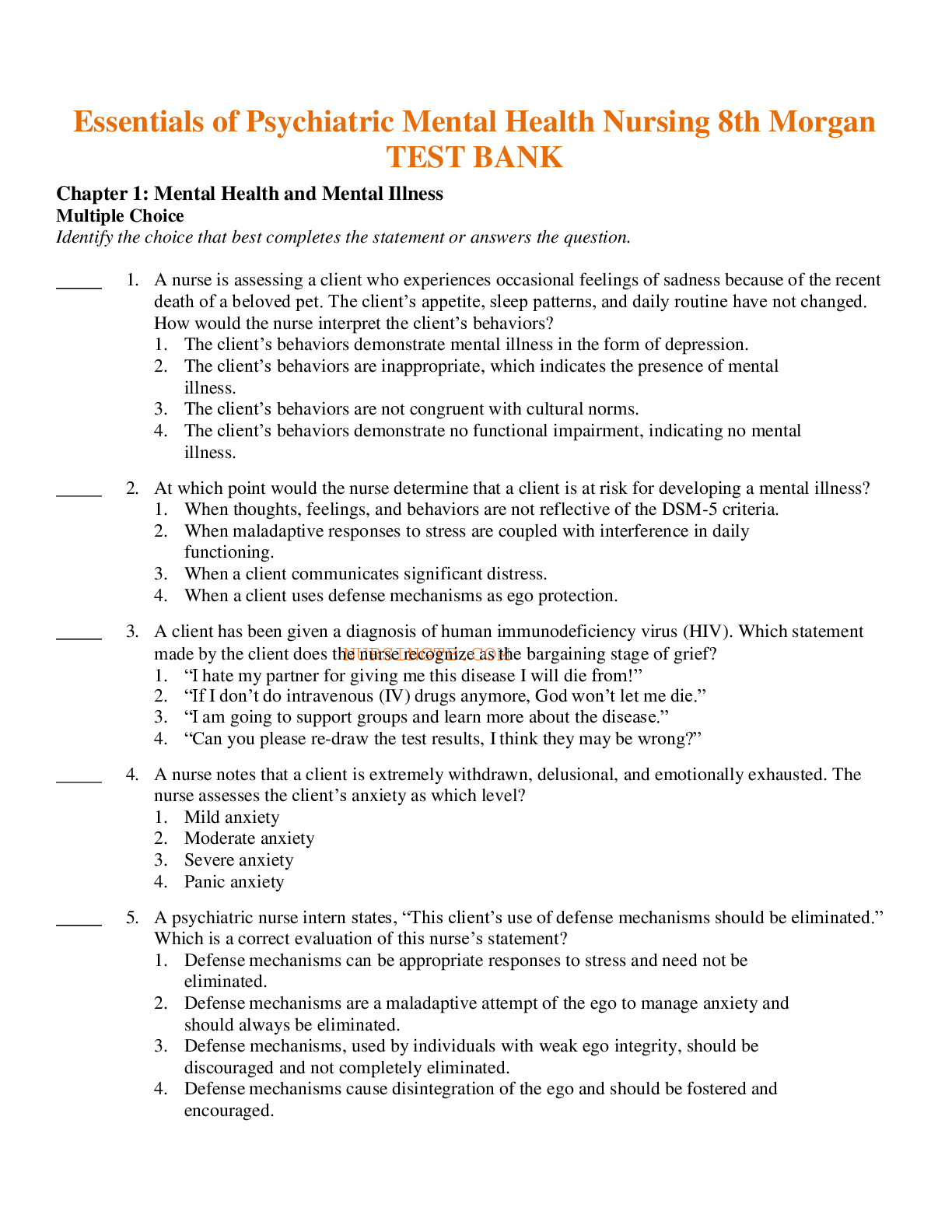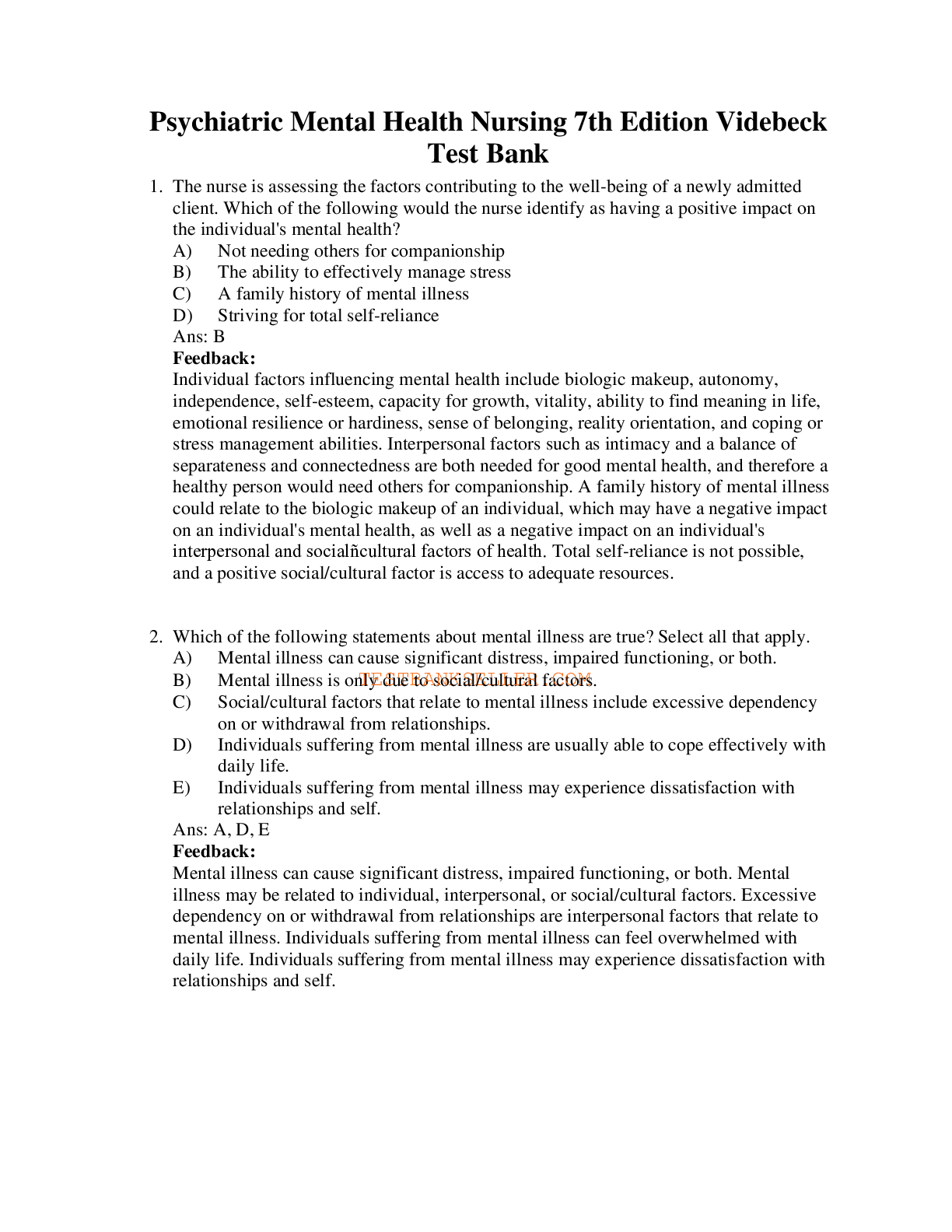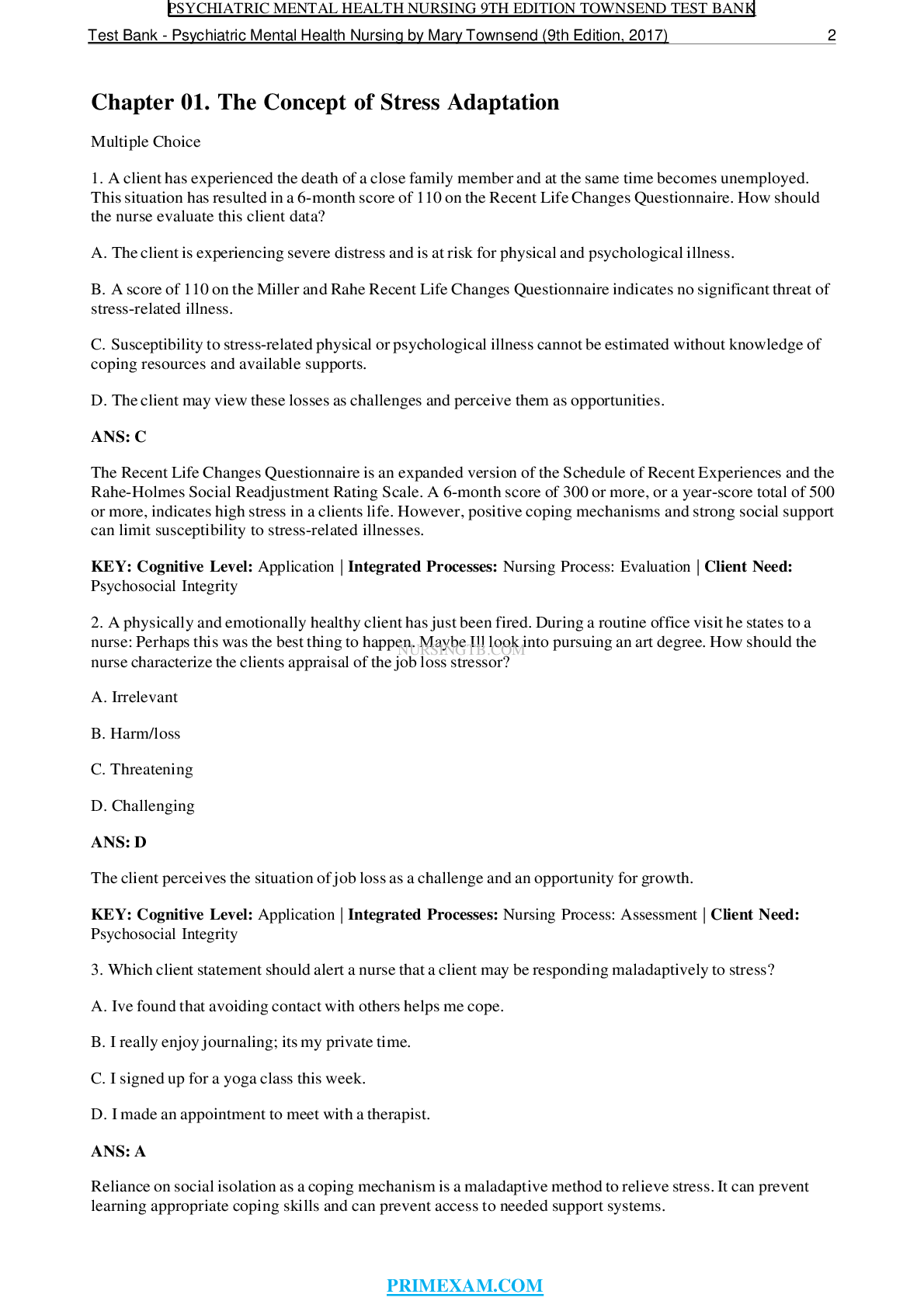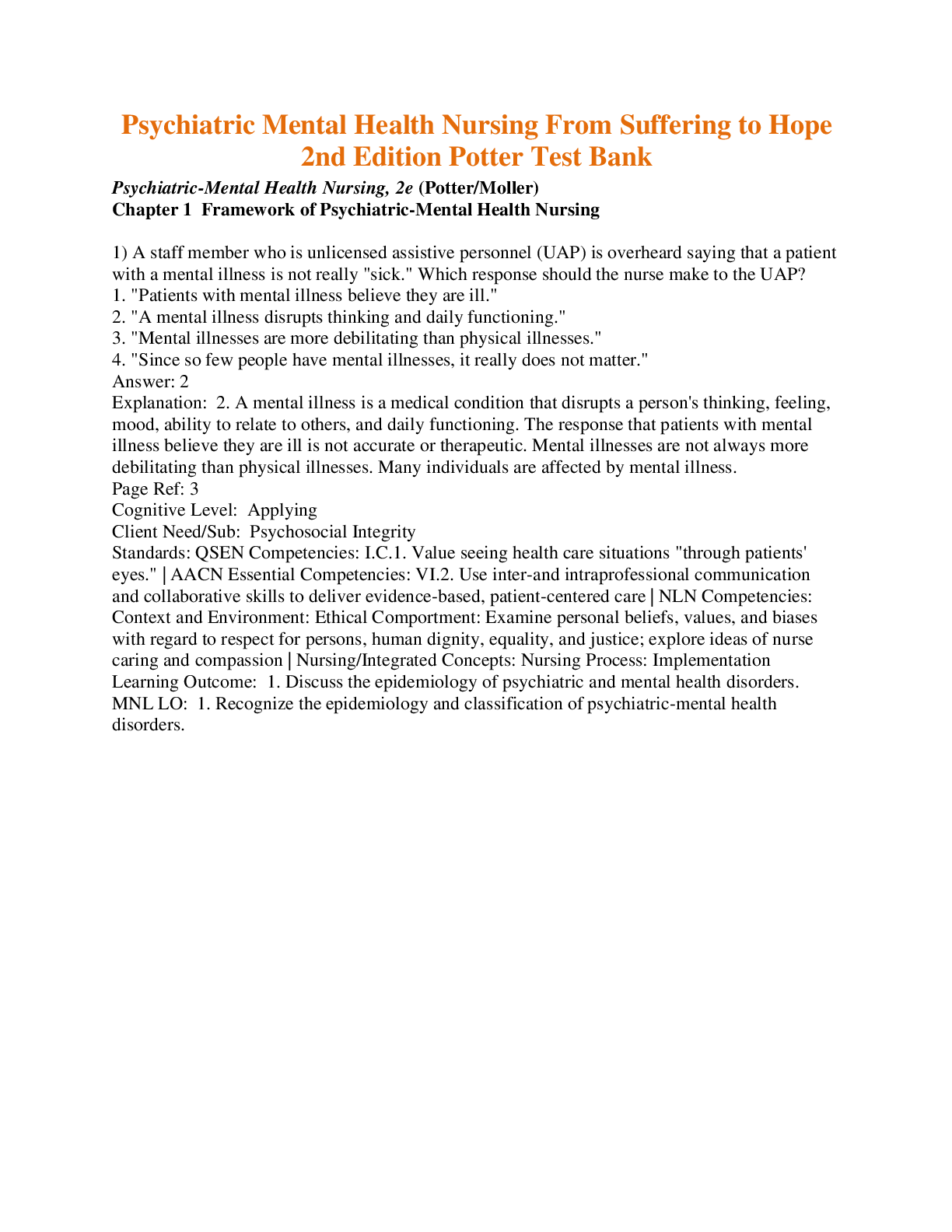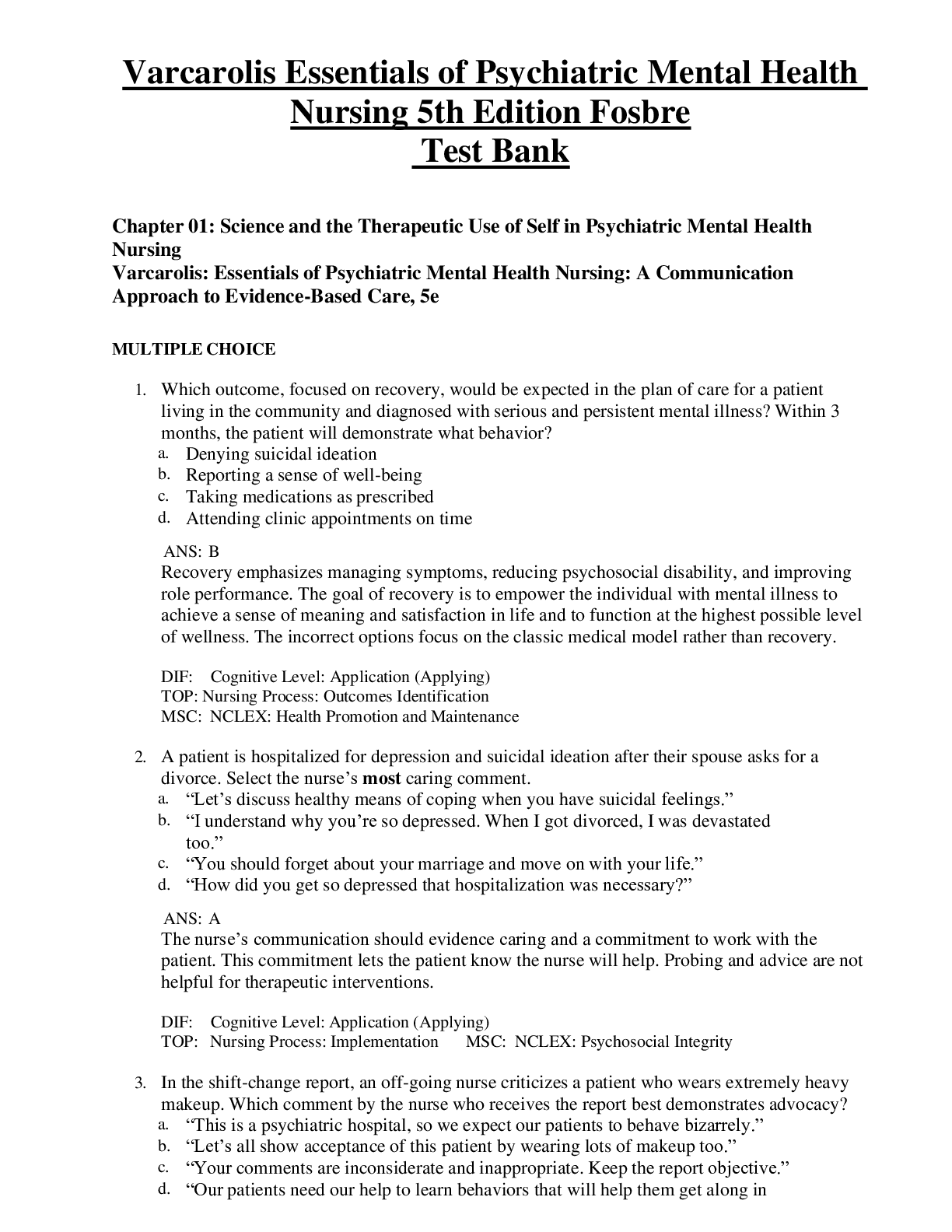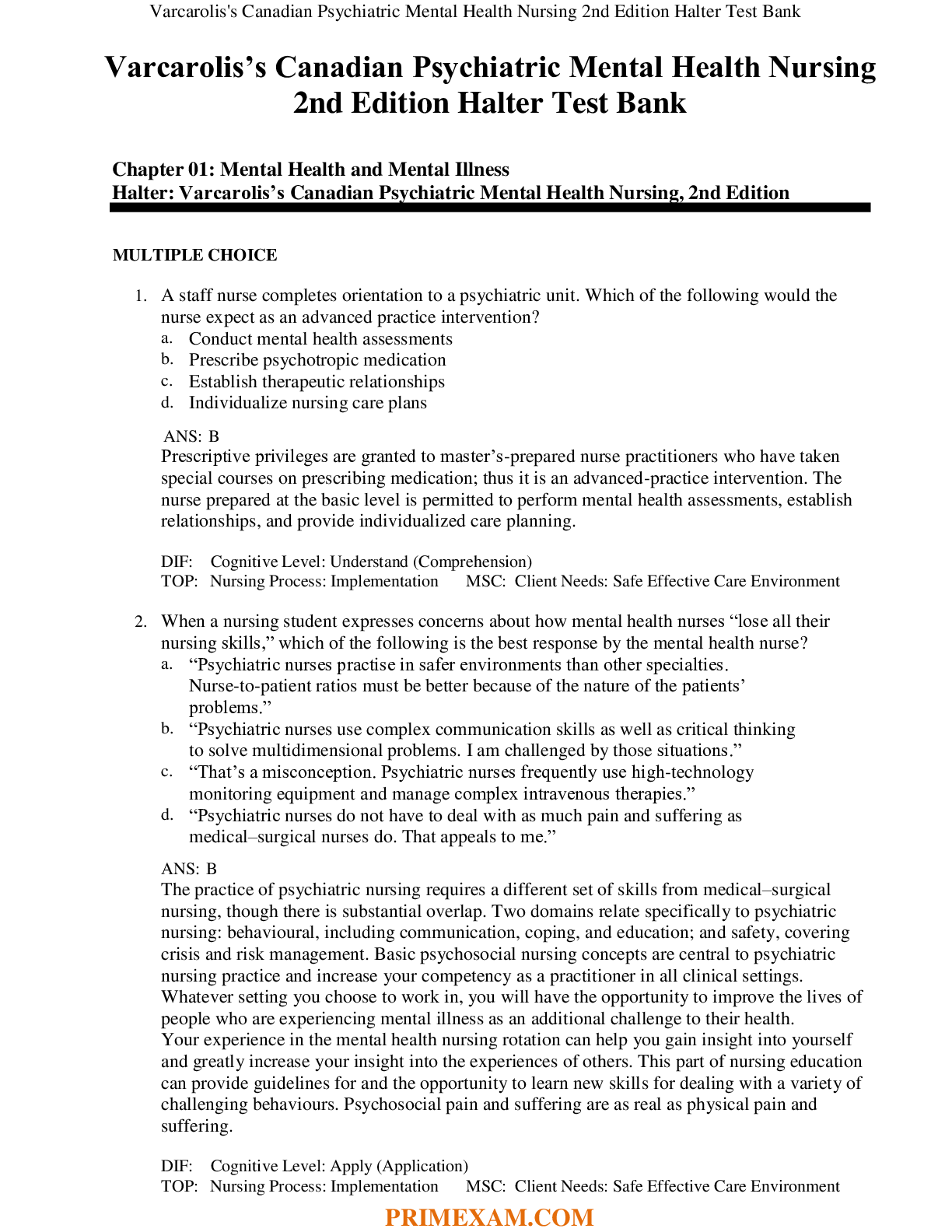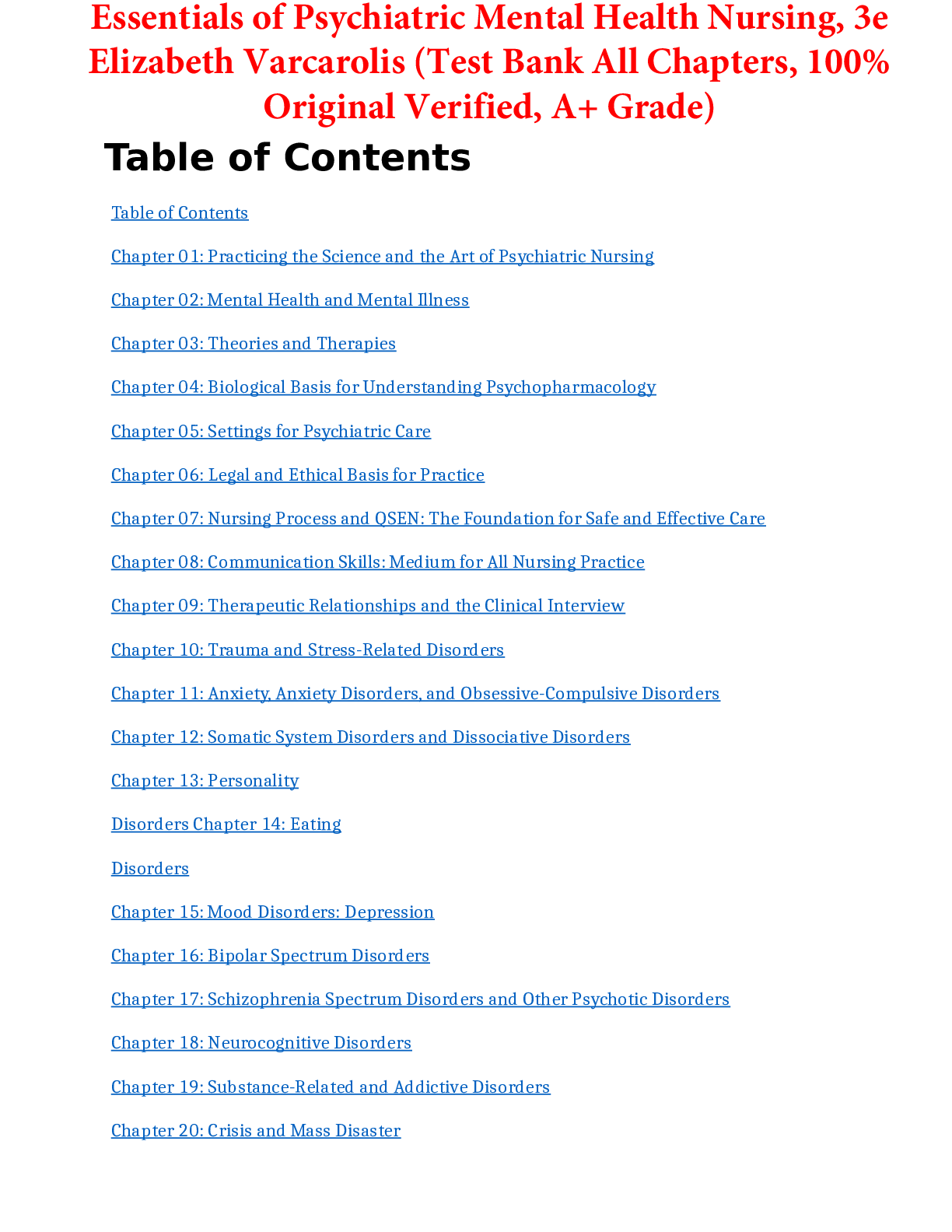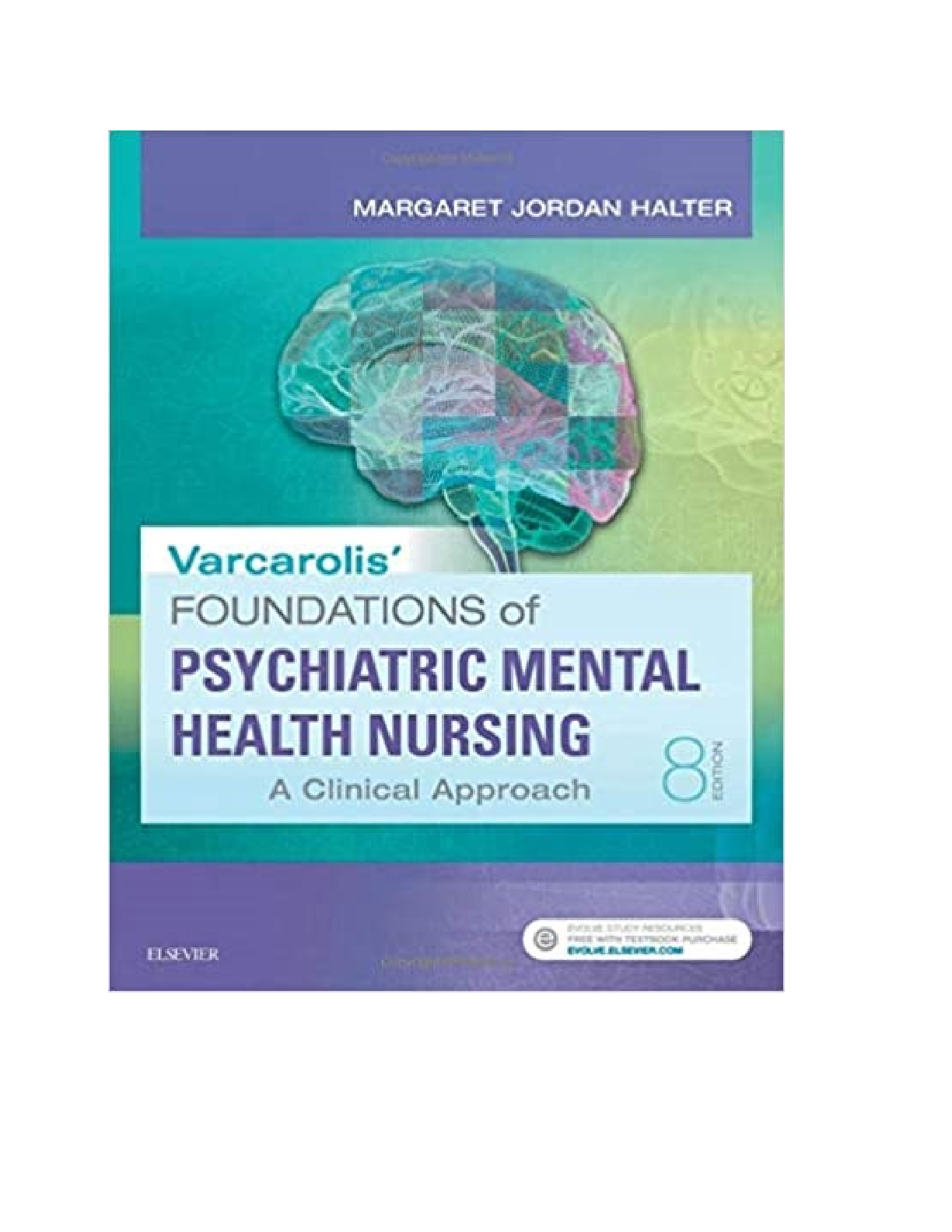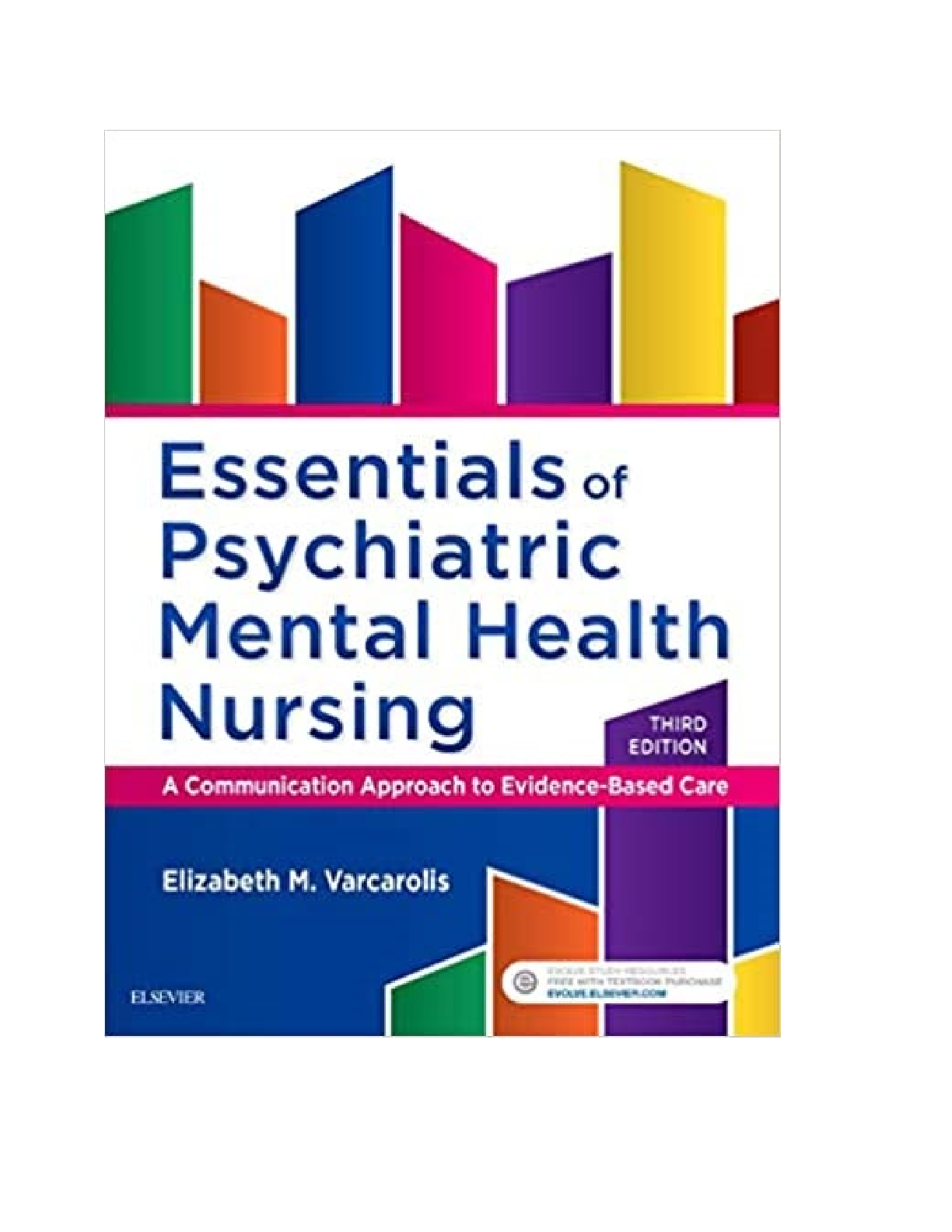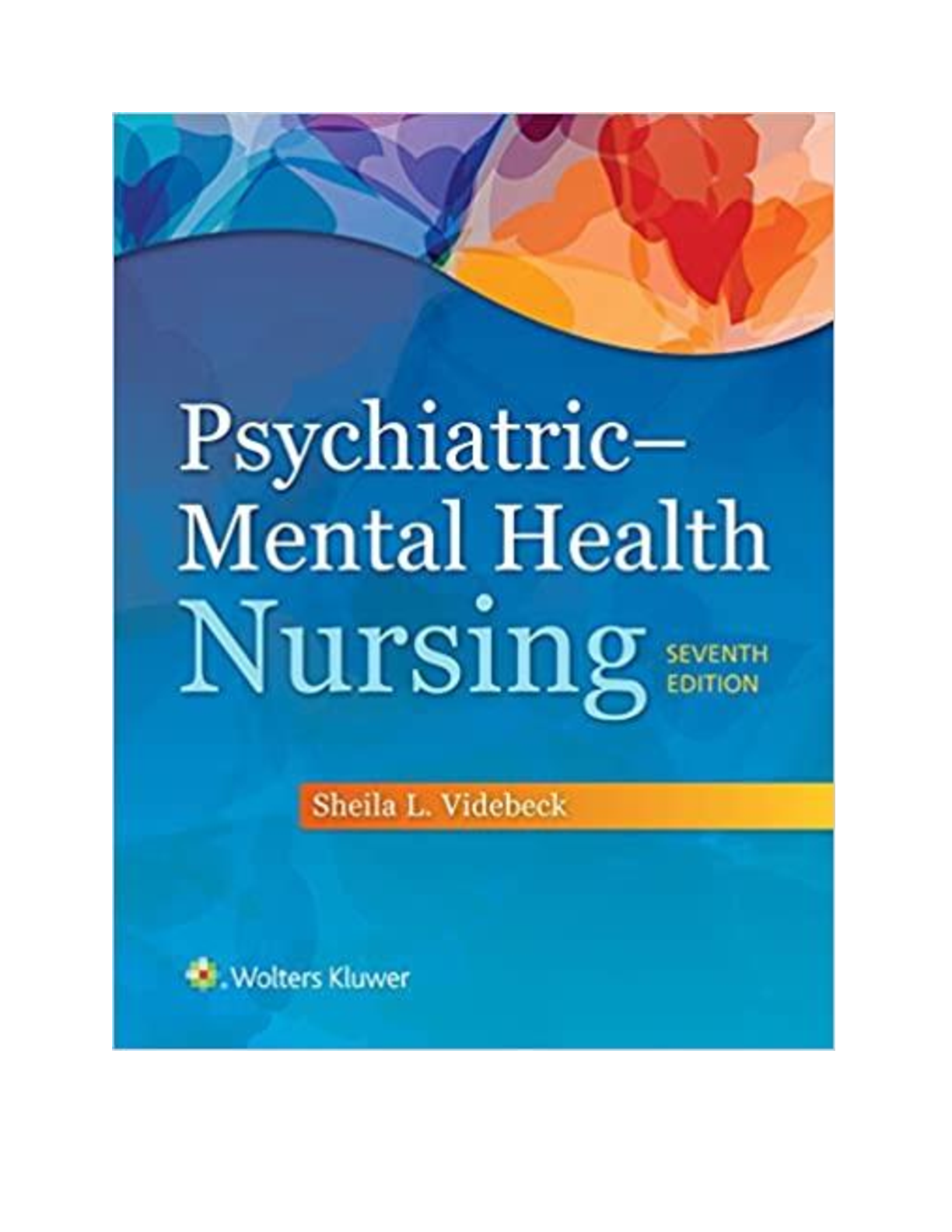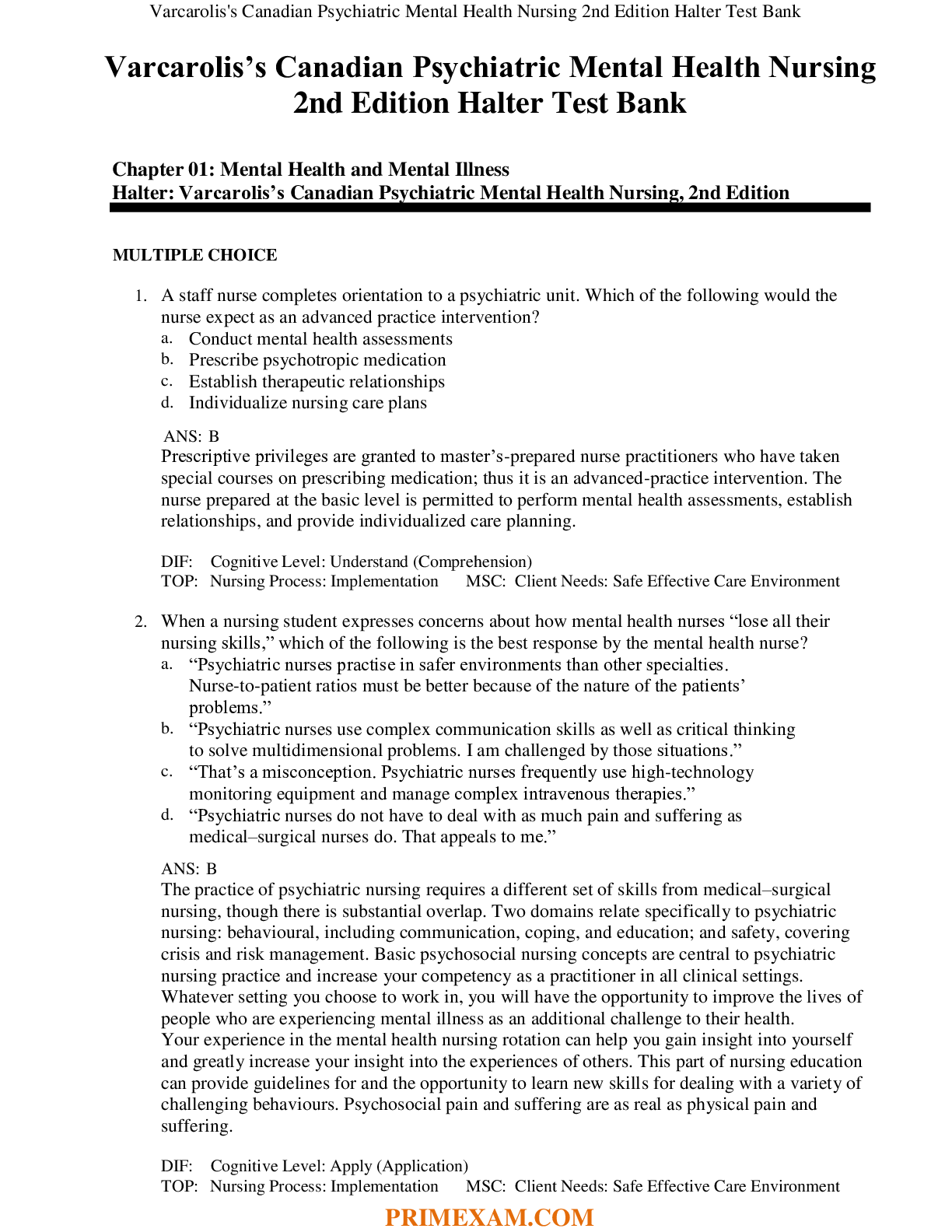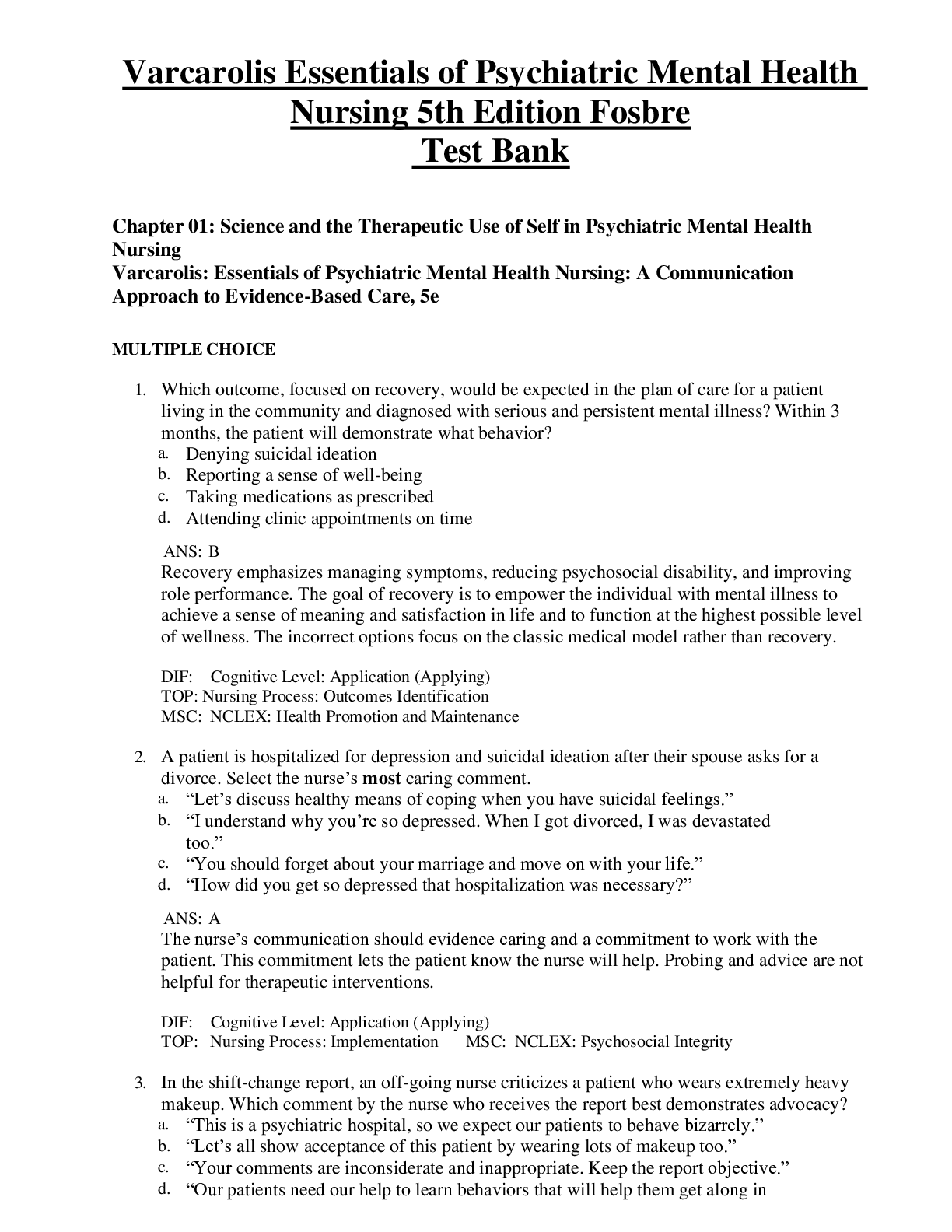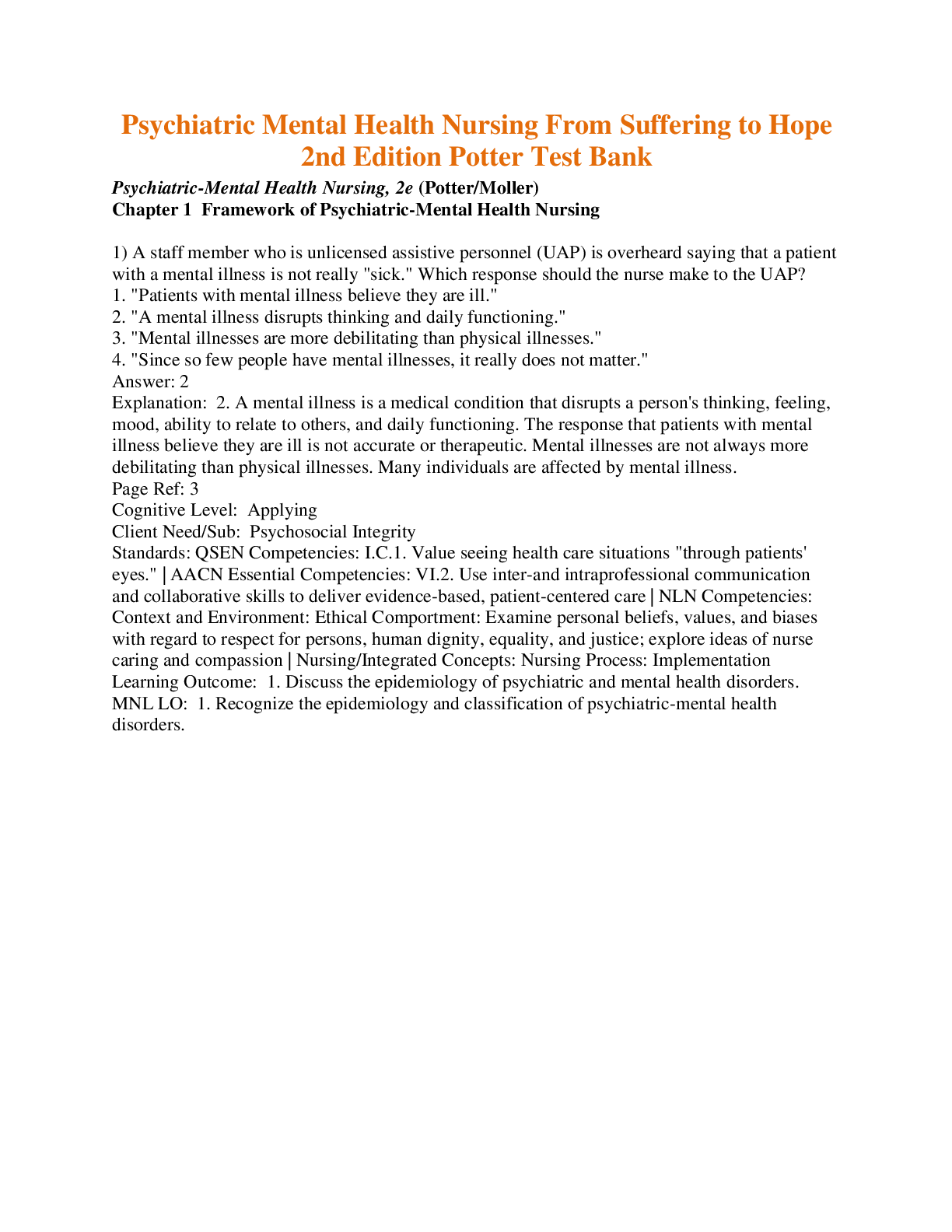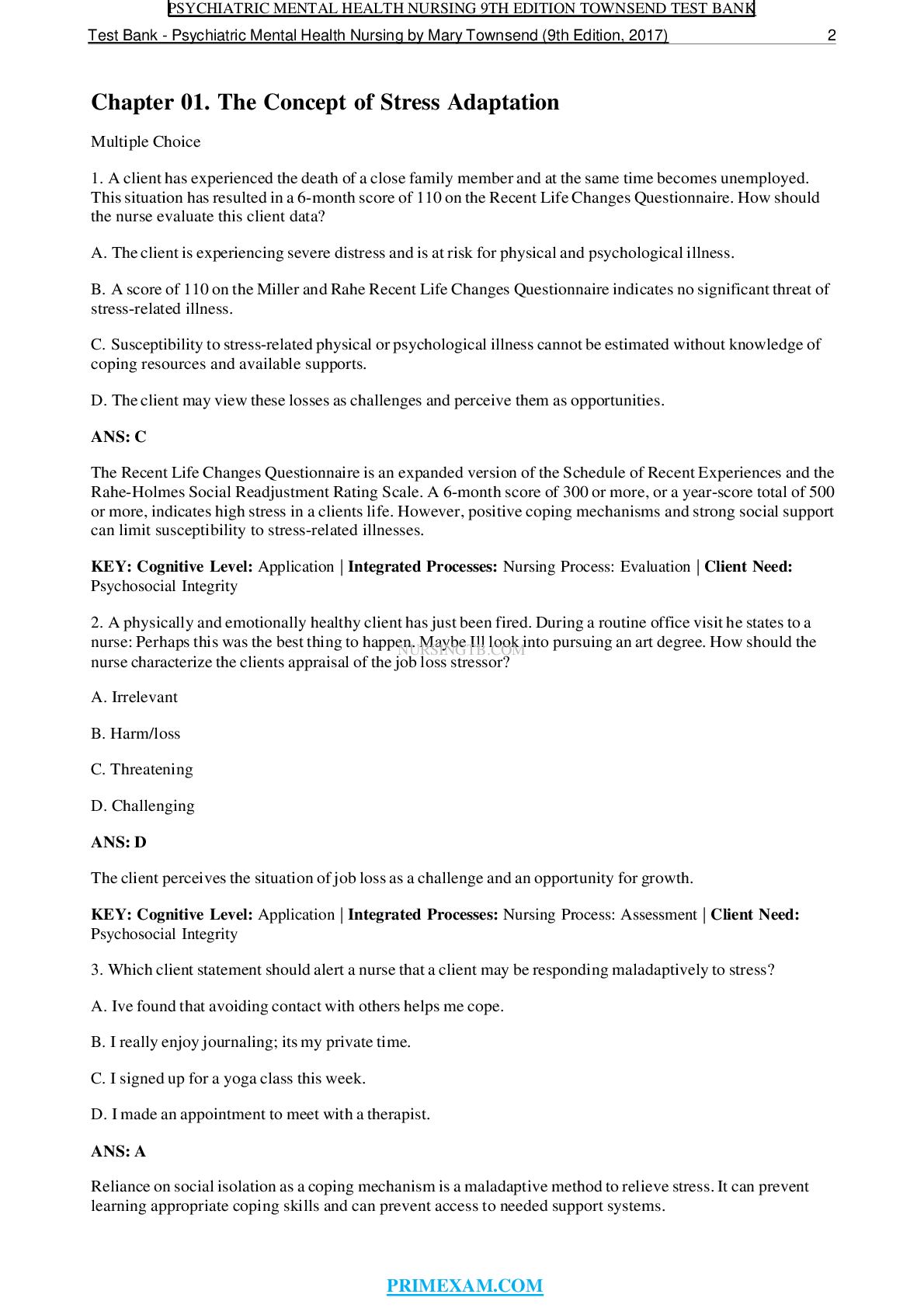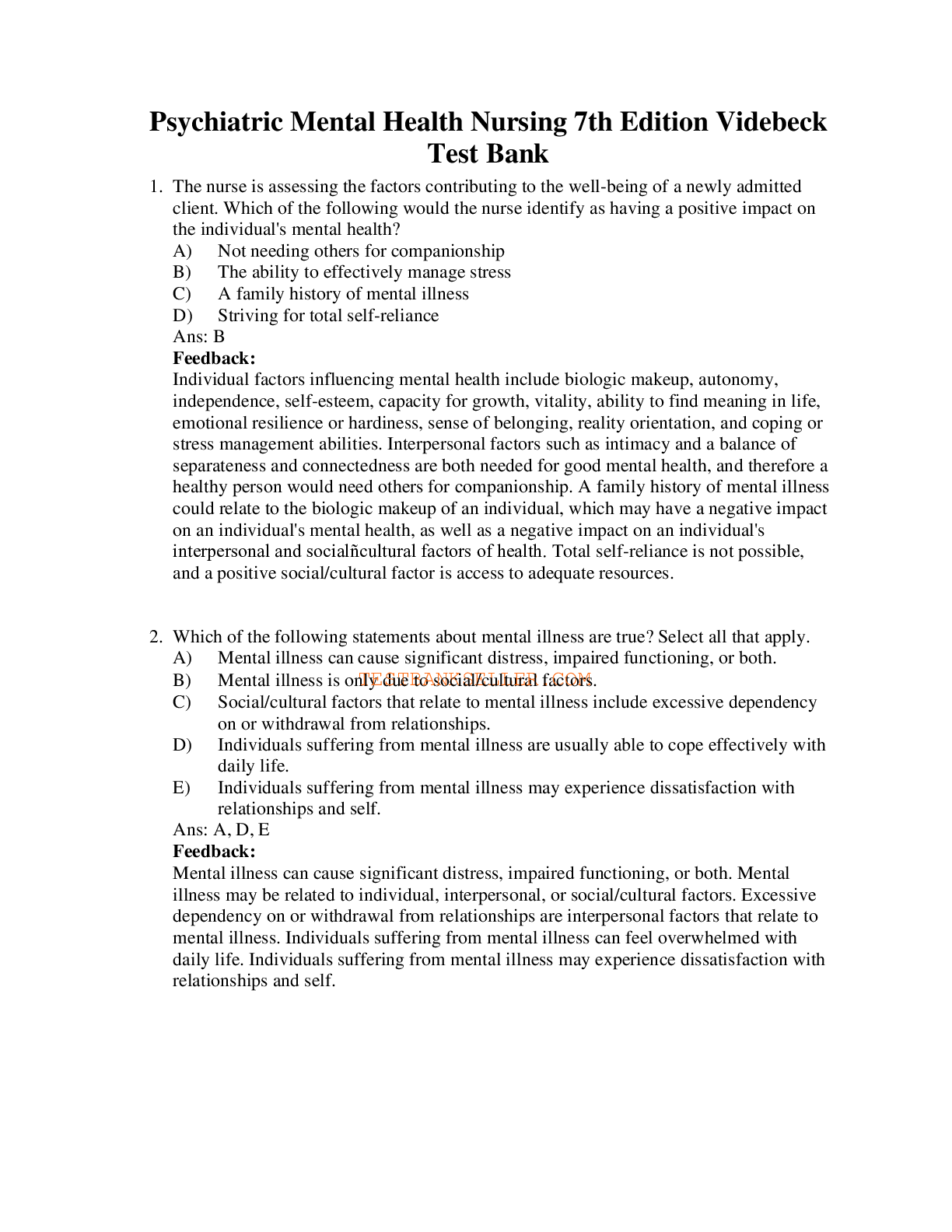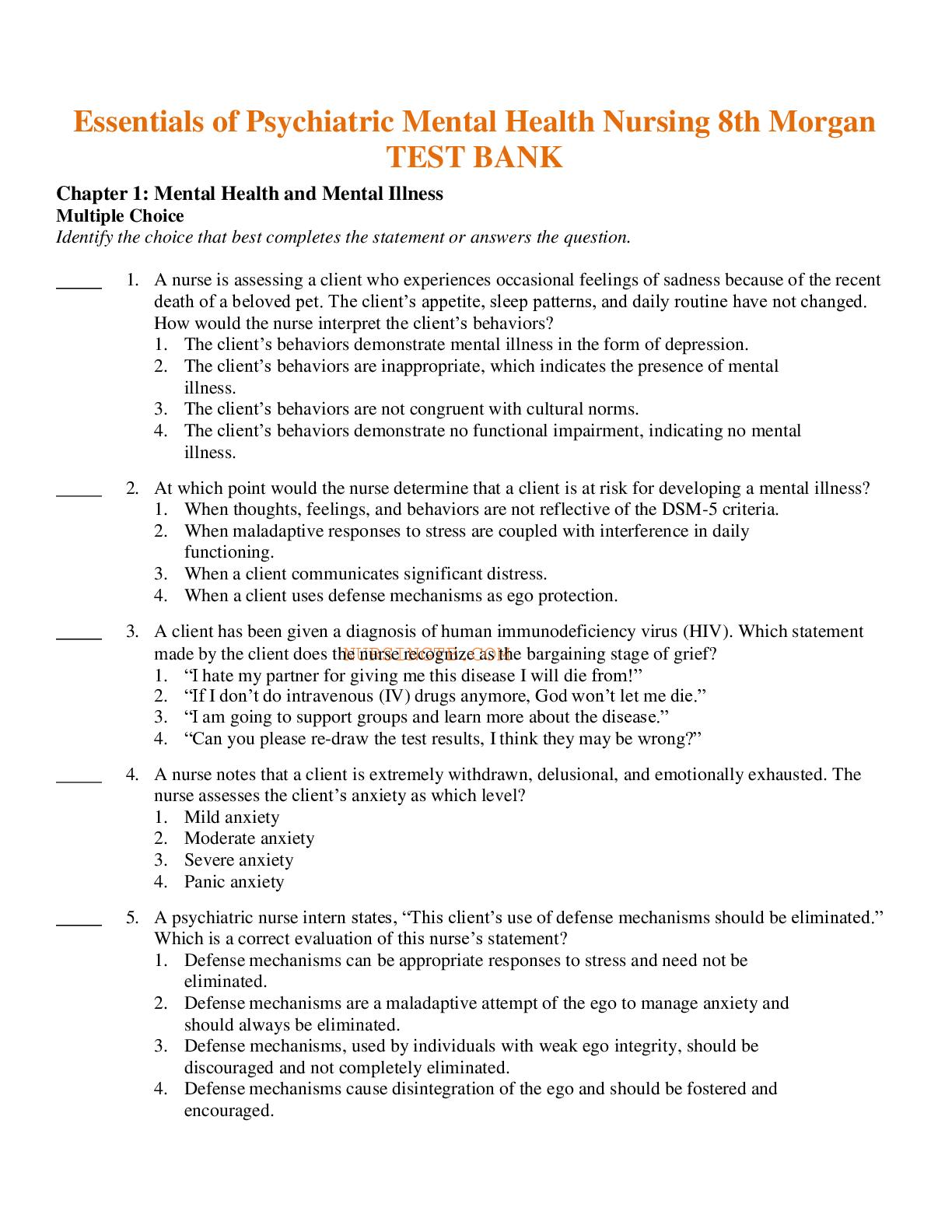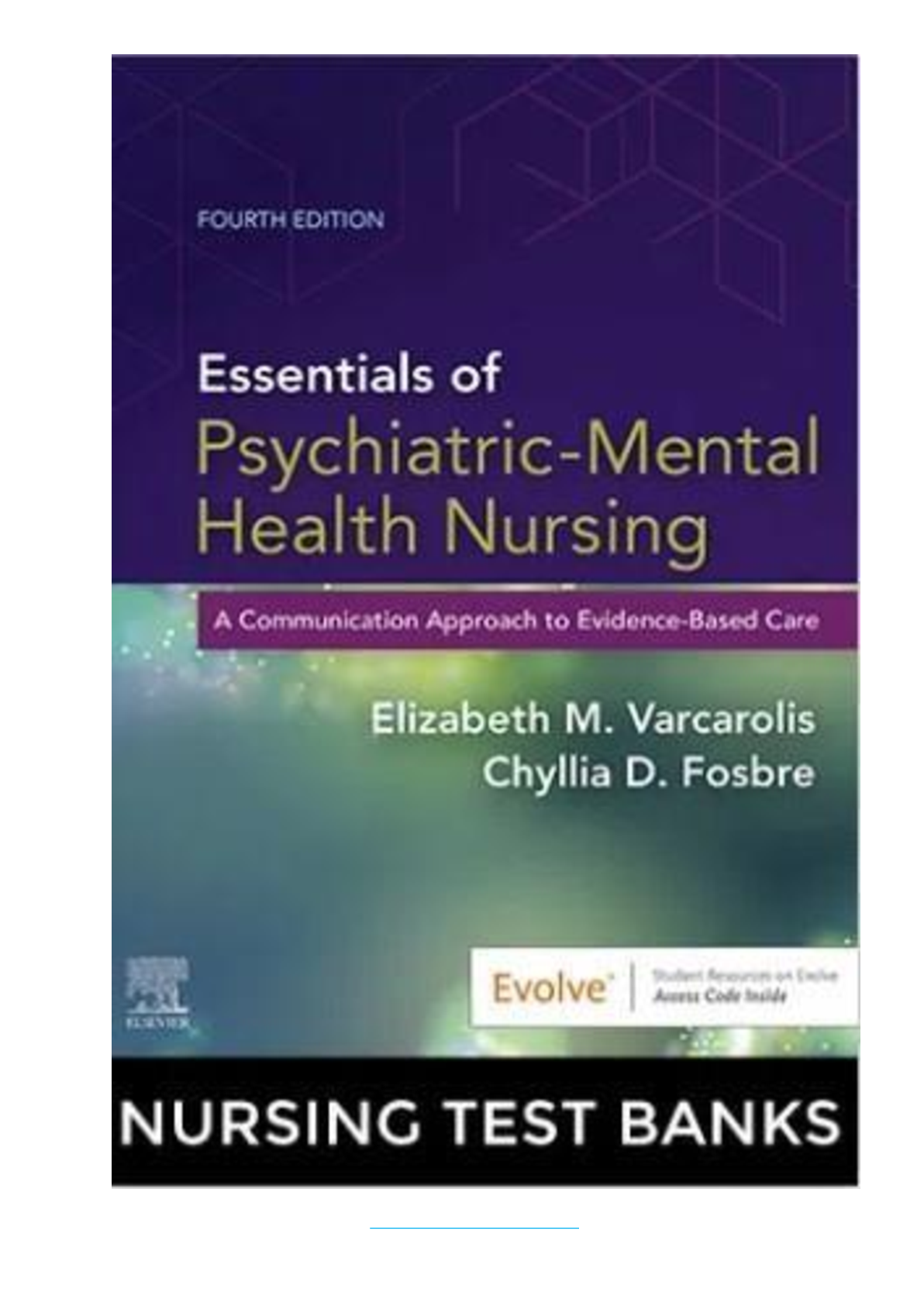ESSENTIALS OF PSYCHIATRIC MENTAL HEALTH NURSING – TEST BANK
Document Content and Description Below
ESSENTIALS OF PSYCHIATRIC MENTAL HEALTH NURSING – TEST BANK Chapter 01: Practicing the Science and the Art of Psychiatric Nursing Chapter 02: Mental Health and Mental Illness Chapter 03: Theories an... d Therapies Chapter 04: Biological Basis for Understanding Psychopharmacology Chapter 05: Settings for Psychiatric Care Chapter 06: Legal and Ethical Basis for Practice Chapter 07: Nursing Process and QSEN: The Foundation for Safe and Effective Care Chapter 08: Communication Skills: Medium for All Nursing Practice Chapter 09: Therapeutic Relationships and the Clinical Interview Chapter 10: Trauma and Stress-Related Disorders Chapter 11: Anxiety, Anxiety Disorders, and Obsessive-Compulsive Disorders Chapter 12: Somatic System Disorders and Dissociative Disorders Chapter 13: Personality Disorders Chapter 14: Eating Disorders Chapter 15: Mood Disorders: Depression Chapter 16: Bipolar Spectrum Disorders Chapter 17: Schizophrenia Spectrum Disorders and Other Psychotic Disorders Chapter 18: Neurocognitive Disorders Chapter 19: Substance-Related and Addictive Disorders Chapter 20: Crisis and Mass Disaster Chapter 21: Child, Partner, and Elder Violence Chapter 22: Sexual Violence Chapter 23: Suicidal Thoughts and Behavior Chapter 24: Anger, Aggression, and Violence Chapter 25: Care for the Dying and Those Who Grieve Chapter 26: Children and Adolescents Chapter 27: Adults Chapter 28: Older Adults Chapter 01: Practicing the Science and the Art of Psychiatric Nursing MULTIPLE CHOICE 1. Which outcome, focused on recovery, would be expected in the plan of care for a patient living in the community and diagnosed with serious and persistent mental illness? Within 3 months, the patient will: a. deny suicidal ideation. b. report a sense of well-being. c. take medications as prescribed. d. attend clinic appointments on time. ANS: B Recovery emphasizes managing symptoms, reducing psychosocial disability, and improving role performance. The goal of recovery is to empower the individual with mental illness to achieve a sense of meaning and satisfaction in life and to function at the highest possible level of wellness. The incorrect options focus on the classic medical model rather than recovery. DIF: Cognitive Level: Application (Applying) REF: 2 TOP: Nursing Process: Outcomes Identification MSC: NCLEX: Health Promotion and Maintenance 2. In the shift-change report, an off-going nurse criticizes a patient who wears heavy makeup. Which comment by the nurse who receives the report best demonstrates advocacy? a. This is a psychiatric hospital. Craziness is what we are all about. b. Lets all show acceptance of this patient by wearing lots of makeup too. c. Your comments are inconsiderate and inappropriate. Keep the report objective. d. Our patients need our help to learn behaviors that will help them get along in society. ANS: D Accepting patients needs for self-expression and seeking to teach skills that will contribute to their well-being demonstrate respect and are important parts of advocacy. The on- coming nurse needs to take action to ensure that others are not prejudiced against the patient. Humor can be appropriate within the privacy of a shift report but not at the expense of respect for patients. Judging the off-going nurse in a critical way will create conflict. Nurses must show compassion for each other. DIF: Cognitive Level: Application (Applying) REF: 8 TOP: Nursing Process: Implementation MSC: NCLEX: Safe, Effective Care Environment 3. A nurse assesses a newly admitted patient diagnosed with major depressive disorder. Which statement is an example of attending? a. We all have stress in life. Being in a psychiatric hospital isnt the end of the world. b. Tell me why you felt you had to be hospitalized to receive treatment for your depression. c. You will feel better after we get some antidepressant medication started for you. d. Id like to sit with you a while so you may feel more comfortable talking with me. ANS: D Attending is a technique that demonstrates the nurses commitment to the relationship and reduces feelings of isolation. This technique shows respect for the patient and demonstrates caring. Generalizations, probing, and false reassurances are non-therapeutic. DIF: Cognitive Level: Application (Applying) REF: 8 TOP: Nursing Process: Implementation MSC: NCLEX: Psychosocial Integrity 4. A patient is hospitalized for depression and suicidal ideation after their spouse asks for a divorce. Select the nurses most caring comment. a. Lets discuss some means of coping other than suicide when you have these feelings. b. I understand why youre so depressed. When I got divorced, I was devastated too. c. You should forget about your marriage and move on with your life. d. How did you get so depressed that hospitalization was necessary? Test Bank: Essentials of Psychiatric Mental Health Nursing (3rd Edition by Varcarolis) 3 ANS: A The nurses communication should evidence caring and a commitment to work with the patient. This commitment lets the patient know the nurse will help. Probing and advice are not helpful or therapeutic interventions. DIF: Cognitive Level: Application (Applying) REF: 6 TOP: Nursing Process: Implementation MSC: NCLEX: Psychosocial Integrity 5. A patient shows the nurse an article from the Internet about a health problem. Which characteristic of the web sites address most alerts the nurse that the site may have biased and prejudiced information? a. Address ends in .org. b. Address ends in .com. c. Address ends in .gov. d. Address ends in .net. ANS: B Financial influences on a site are a clue that the information may be biased. .com at the end of the address indicates that the site is a commercial one. .gov indicates that the site is maintained by a government entity. .org indicates that the site is nonproprietary; the site may or may not have reliable information, but it does not profit from its activities. .net can have multiple meanings. DIF: Cognitive Level: Comprehension (Understanding) REF: 5 TOP: Nursing Process: Evaluation MSC: NCLEX: Health Promotion and Maintenance 6. A nurse says, When I was in school, I learned to call upset patients by name to get their attention; however, I read a descriptive research study that says that this approach does not work. I plan to stop calling patients by name. Which statement is the best appraisal of this nurses comment? a. One descriptive research study rarely provides enough evidence to change practice. b. Staff nurses apply new research findings only with the help from clinical nurse specialists. c. New research findings should be incorporated into clinical algorithms before using them in practice. d. The nurse misinterpreted the results of the study. Classic tenets of practice do not change. ANS: A Descriptive research findings provide evidence for practice but must be viewed in relation to other studies before practice changes. One study is not enough. Descriptive studies are low on the hierarchy of evidence. Clinical algorithms use flow charts to manage problems and do not specify one response to a clinical problem. Classic tenets of practice should change as research findings provide evidence for change. DIF: Cognitive Level: Analysis (Analyzing) REF: 3 TOP: Nursing Process: Evaluation MSC: NCLEX: Health Promotion and Maintenance 7. Two nursing students discuss career plans after graduation. One student wants to enter psychiatric nursing. The other student asks, Why would you want to be a psychiatric nurse? All they do is talk. You will lose your skills. Select the best response by the student interested in psychiatric nursing. a. Psychiatric nurses practice in safer environments than other specialties. Nurse-to-patient ratios must be better because of the nature of patients problems. b. Psychiatric nurses use complex communication skills, as well as critical thinking, to solve multidimensional problems. Im challenged by those situations. c. I think I will be good in the mental health field. I do not like clinical rotations in school, so I do not want to continue them after I graduate. d. Psychiatric nurses do not have to deal with as much pain and suffering as medical surgical nurses. That appeals to me. ANS: B The practice of psychiatric nursing requires a different set of skills than medical surgical nursing, although substantial overlap does exist. Psychiatric nurses must be able to help patients with medical and mental health problems, reflecting the holistic perspective these nurses must have. Nurse-patient ratios and workloads in psychiatric settings have increased, similar to other specialties. Psychiatric nursing involves clinical practice, Test Bank: Essentials of Psychiatric Mental Health Nursing (3rd Edition by Varcarolis) 4 not simply documentation. Psychosocial pain is real and can cause as much suffering as physical pain. DIF: Cognitive Level: Application (Applying) REF: 3 TOP: Nursing Process: Implementation MSC: NCLEX: Safe, Effective Care Environment 8. Which research evidence would most influence a group of nurses to change their practice? a. Expert committee report of recommendations for practice b. Systematic review of randomized controlled trials c. Nonexperimental descriptive study d. Critical pathway ANS: B Research findings are graded using a hierarchy of evidence. A systematic review of randomized controlled trials is Level A and provides the strongest evidence for changing practice. Expert committee recommendations and descriptive studies lend less powerful and influential evidence. A critical pathway is not evidence; it incorporates research findings after they have been analyzed. DIF: Cognitive Level: Comprehension (Understanding) REF: 3 TOP: Nursing Process: Planning MSC: NCLEX: Safe, Effective Care Environment 9. A bill introduced in Congress would reduce funding for the care of people diagnosed with mental illnesses. A group of nurses write letters to their elected representatives in opposition to the legislation. Which role have the nurses fulfilled? a. Advocacy b. Attending c. Recovery d. Evidence-based practice ANS: A An advocate defends or asserts anothers cause, particularly when the other person lacks the ability to do that for himself or herself. Examples of individual advocacy include helping patients understand their rights or make decisions. On a community scale, advocacy includes political activity, public speaking, and publication in the interest of improving the individuals with mental illness; the letter-writing campaign advocates for that cause on behalf of patients who are unable to articulate their own needs. DIF: Cognitive Level: Comprehension (Understanding) REF: 8 TOP: Nursing Process: Implementation MSC: NCLEX: Safe, Effective Care Environment 10. An informal group of patients discuss their perceptions of nursing care. Which comment best indicates a patients perception that his or her nurse is caring? a. My nurse always asks me which type of juice I want to help me swallow my medication. b. My nurse explained my treatment plan to me and asked for my ideas about how to make it better. c. My nurse told me that if I take all the medicines the doctor prescribes I will get discharged soon. d. My nurse spends time listening to me talk about my problems. That helps me feel like Im not alone. ANS: D Caring evidences empathic understanding, as well as competency. It helps change pain and suffering into a shared experience, creating a human connection that alleviates feelings of isolation. The incorrect options give examples of statements that demonstrate advocacy or giving advice. DIF: Cognitive Level: Application (Applying) REF: 3 TOP: Nursing Process: Evaluation MSC: NCLEX: Psychosocial Integrity 11. A patient who immigrated to the United States from Honduras was diagnosed with schizophrenia. The patient took an antipsychotic medication for 3 weeks but showed no improvement. Which resource should the treatment team consult for information on more effective medications for this patient? a. Clinical algorithm b. Clinical pathway c. Clinical practice guideline Test Bank: Essentials of Psychiatric Mental Health Nursing (3rd Edition by Varcarolis) 5 d. International Statistical Classification of Diseases and Related Health Problems (ICD) ANS: A A clinical algorithm is a guideline that describes diagnostic and/or treatment approaches drawn from large databases of information. These guidelines help the treatment team make decisions cognizant of an individual patients needs, such as ethnic origin, age, or gender. A clinical pathway is a map of interventions and treatments related to a specific disorder. Clinical practice guidelines summarize best practices about specific health problems. The ICD classifies diseases. DIF: Cognitive Level: Application (Applying) REF: 5 TOP: Nursing Process: Evaluation MSC: NCLEX: Safe, Effective Care Environment 12. Which historical nursing leader helped focus practice to recognize the importance of science in psychiatric nursing? a. Abraham Maslow b. Hildegard Peplau c. Kris Martinsen d. Harriet Bailey ANS: B Although all these leaders included science as an important component of practice, Hildegard Peplau most influenced its development in psychiatric nursing. Maslow was not a nurse, but his theories influence how nurses prioritize problems and care. Bailey wrote a textbook in the 1930s on psychiatric nursing interventions. Kris Martinsen emphasized the importance of caring in nursing practice. DIF: Cognitive Level: Knowledge (Remembering) REF: 4 TOP: Nursing Process: N/A MSC: NCLEX: Psychosocial Integrity 13. A nurse consistently strives to demonstrate caring behaviors during interactions with patients. Which reaction by a patient indicates this nurse is effective? A patient reports feeling: a. distrustful of others. b. connected with others. c. uneasy about the future. d. discouraged with efforts to improve. ANS: B A patient is likely to respond to caring with a sense of connectedness with others. The absence of caring can make patients feel distrustful, disconnected, uneasy, and discouraged. DIF: Cognitive Level: Comprehension (Understanding) REF: 7 TOP: Nursing Process: Evaluation MSC: NCLEX: Psychosocial Integrity MULTIPLE RESPONSE 1. An experienced nurse says to a new graduate, When youve practiced as long as I have, you will instantly know how to take care of psychotic patients. What is the new graduates best analysis of this comment? Select all that apply. a. The experienced nurse may have lost sight of patients individuality, which may compromise the integrity of practice. b. New research findings must be continually integrated into a nurses practice to provide the most effective care. c. Experience provides mental health nurses with the tools and skills needed for effective professional practice. d. Experienced psychiatric nurses have learned the best ways to care for psychotic patients through trial and error. e. Effective psychiatric nurses should be continually guided by an intuitive sense of patients needs. ANS: A, B Evidence-based practice involves using research findings to provide the most effective nursing care. Evidence is continually emerging; therefore, nurses cannot rely solely on experience. The effective nurse also maintains Test Bank: Essentials of Psychiatric Mental Health Nursing (3rd Edition by Varcarolis) 6 respect for each patient as an individual. Overgeneralization compromises that perspective. Intuition and trial and error are unsystematic approaches to care. DIF: Cognitive Level: Application (Applying) REF: 2 TOP: Nursing Process: Evaluation MSC: NCLEX: Safe, Effective Care Environment 2. Which patient statements identify qualities of nursing practice with high therapeutic value? (Select all that apply.) My nurse: a. talks in language I can understand. b. helps me keep track of my medications. c. is willing to go to social activities with me. d. lets me do whatever I choose without interfering. e. looks at me as a whole person with different needs. ANS: A, B, E Each correct answer demonstrates caring is an example of appropriate nursing foci: communicating at a level understandable to the patient, using holistic principles to guide care, and providing medication supervision. The incorrect options suggest a laissez-faire attitude on the part of the nurse, when the nurse should instead provide thoughtful feedback and help patients test alternative solutions or violate boundaries. DIF: Cognitive Level: Application (Applying) REF: 6 TOP: Nursing Process: Implementation MSC: NCLEX: Psychosocial Integrity Test Bank: Essentials of Psychiatric Mental Health Nursing (3rd Edition by Varcarolis) 7 Chapter 02: Mental Health and Mental Illness MULTIPLE CHOICE 1. An 86-year-old, previously healthy and independent, falls after an episode of vertigo. Which behavior by this patient best demonstrates resilience? The patient: a. says, I knew this would happen eventually. b. stops attending her weekly water aerobics class. c. refuses to use a walker and says, I dont need that silly thing. d. says, Maybe some physical therapy will help me with my balance. ANS: D Resiliency is the ability to recover from or adjust to misfortune and change. The correct response indicates that the patient is hopeful and thinking positively about ways to adapt to the vertigo. Saying I knew this would happen eventually and discontinuing healthy activities suggest a hopeless perspective on the health change. Refusing to use a walker indicates denial. DIF: Cognitive Level: Comprehension (Understanding) REF: 14 TOP: Nursing Process: Assessment MSC: NCLEX: Psychosocial Integrity 2. A patient is admitted to the psychiatric hospital. Which assessment finding best indicates that the patient has a mental illness? The patient: a. describes coping and relaxation strategies used when feeling anxious. b. describes mood as consistently sad, discouraged, and hopeless. c. can perform tasks attempted within the limits of own abilities. d. reports occasional problems with insomnia. ANS: B A patient who reports having a consistently negative mood is describing a mood alteration. The incorrect options describe mentally healthy behaviors and common problems that do not indicate mental illness. DIF: Cognitive Level: Application (Applying) REF: 11 TOP: Nursing Process: Assessment MSC: NCLEX: Psychosocial Integrity 3. The goal for a patient is to increase resiliency. Which outcome should a nurse add to the plan of care? Within 3 days, the patient will: a. describe feelings associated with loss and stress. b. meet own needs without considering the rights of others. c. identify healthy coping behaviors in response to stressful events. d. allow others to assume responsibility for major areas of own life. ANS: C The patients ability to identify healthy coping behaviors indicates adaptive, healthy behavior and demonstrates an increased ability to recover from severe stress. Describing feelings associated with loss and stress does not move the patient toward adaptation. The remaining options are maladaptive behaviors. DIF: Cognitive Level: Analysis (Analyzing) REF: 14 TOP: Nursing Process: Outcomes Identification MSC: NCLEX: Psychosocial Integrity 4. Which organization actively seeks to reduce the stigma associated with mental illness through public presentations such as In Our Own Voice (IOOV)? a. American Psychiatric Association (APA) b. National Alliance on Mental Illness (NAMI) c. United States Department of Health and Human Services (USDHHS) d. North American Nursing Diagnosis Association International (NANDA-I) ANS: B Stigma represents the bias and prejudice commonly held regarding mental illness. NAMI actively seeks to Test Bank: Essentials of Psychiatric Mental Health Nursing (3rd Edition by Varcarolis) 8 dispel misconceptions about mental illness. NANDA-I defines approved nursing diagnoses. The APA publishes the DSM 5. The USDHHS regulates and administers health policies. DIF: Cognitive Level: Knowledge (Remembering) REF: 19 TOP: Nursing Process: Evaluation MSC: NCLEX: Safe, Effective Care Environment 5. A nurse must assess several new patients at a community mental health center. Conclusions concerning current functioning should be made on the basis of: a. the degree of conformity of the individual to societys norms. b. the degree to which an individual is logical and rational. c. a continuum from mentally healthy to unhealthy. d. the rate of intellectual and emotional growth. ANS: C Because mental health and mental illness are relative concepts, assessment of functioning is made by using a continuum. Mental health is not based on conformity; some mentally healthy individuals do not conform to societys norms. Most individuals occasionally display illogical or irrational thinking. The rate of intellectual and emotional growth is not the most useful criterion to assess mental health or mental illness [Show More]
Last updated: 8 months ago
Preview 1 out of 405 pages
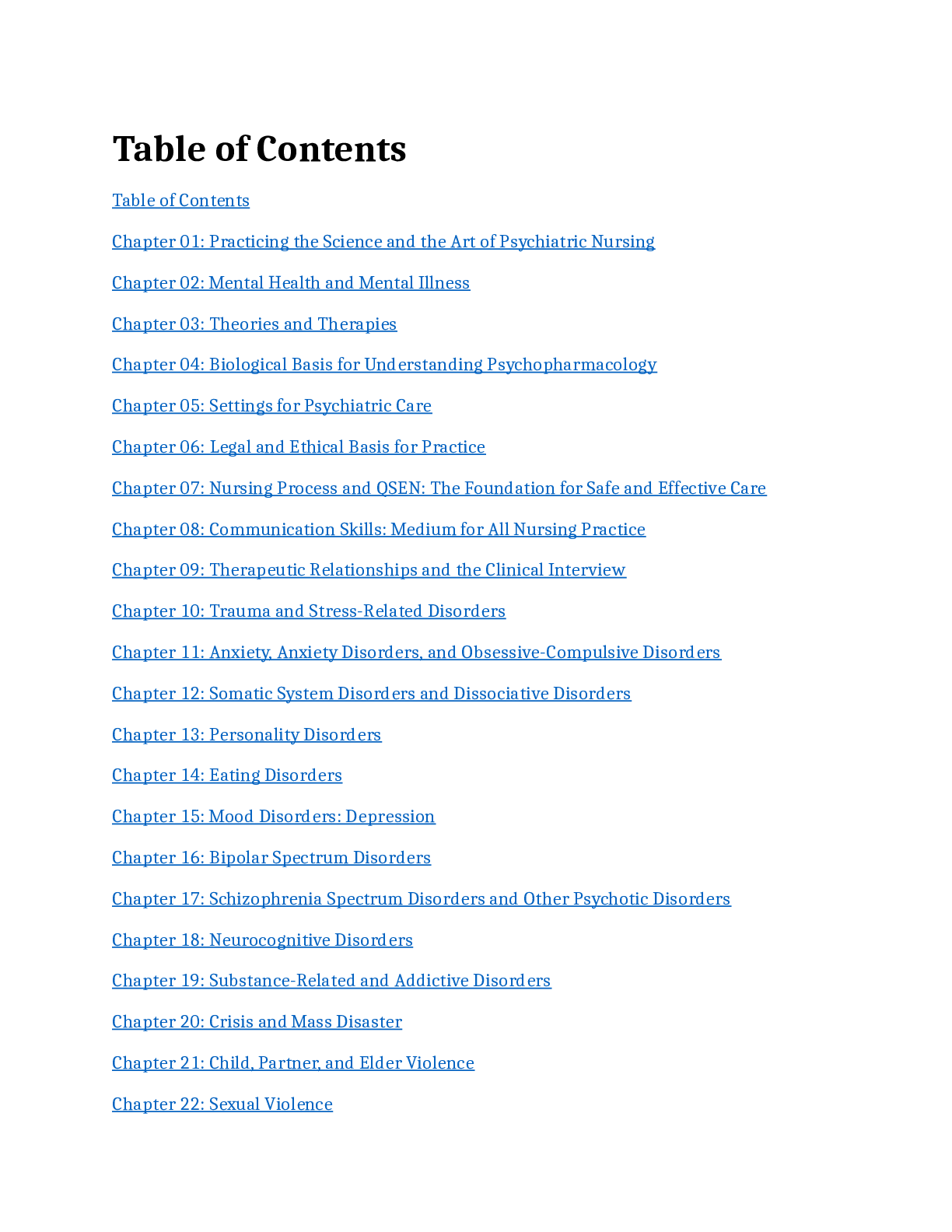
Reviews( 0 )
Document information
Connected school, study & course
About the document
Uploaded On
Aug 11, 2021
Number of pages
405
Written in
Additional information
This document has been written for:
Uploaded
Aug 11, 2021
Downloads
0
Views
164

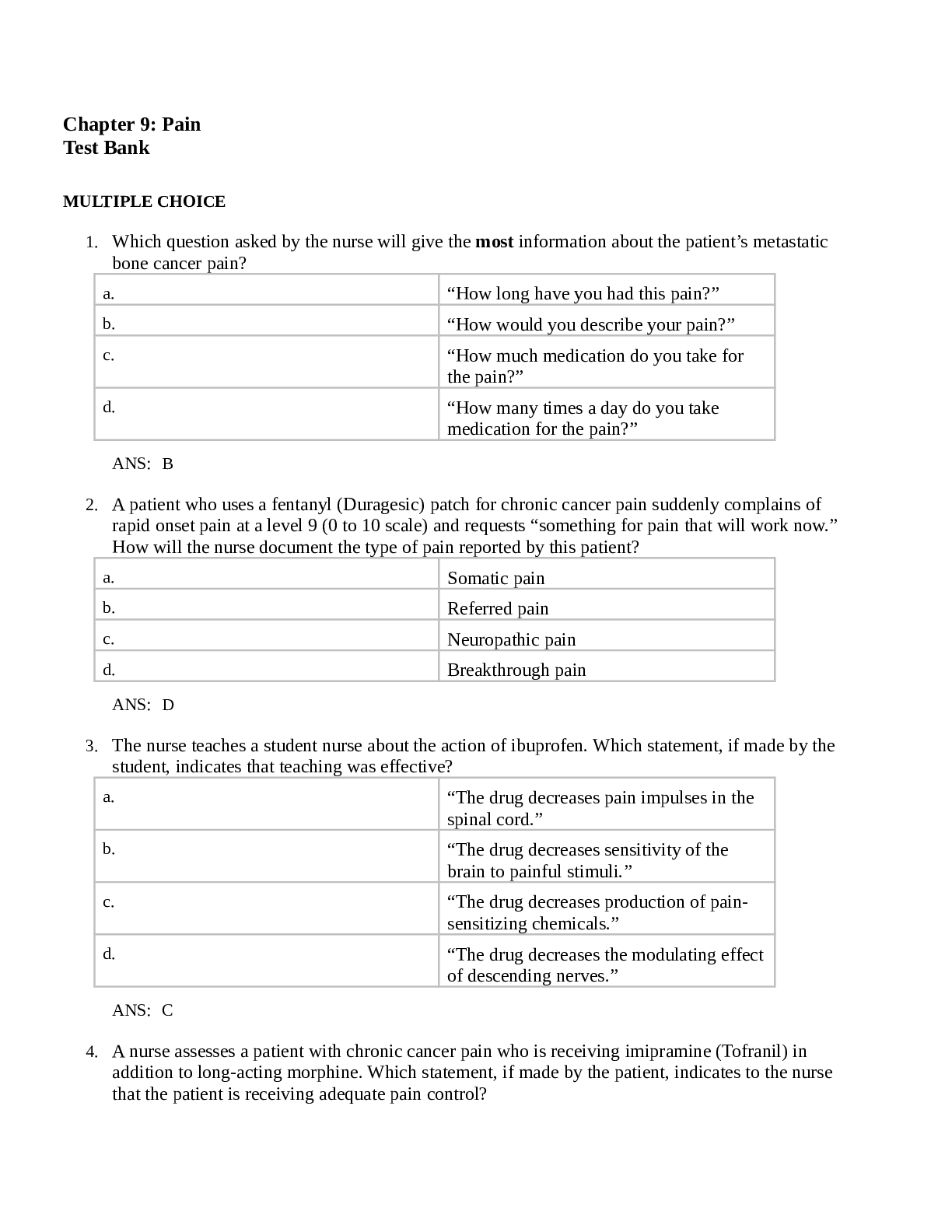
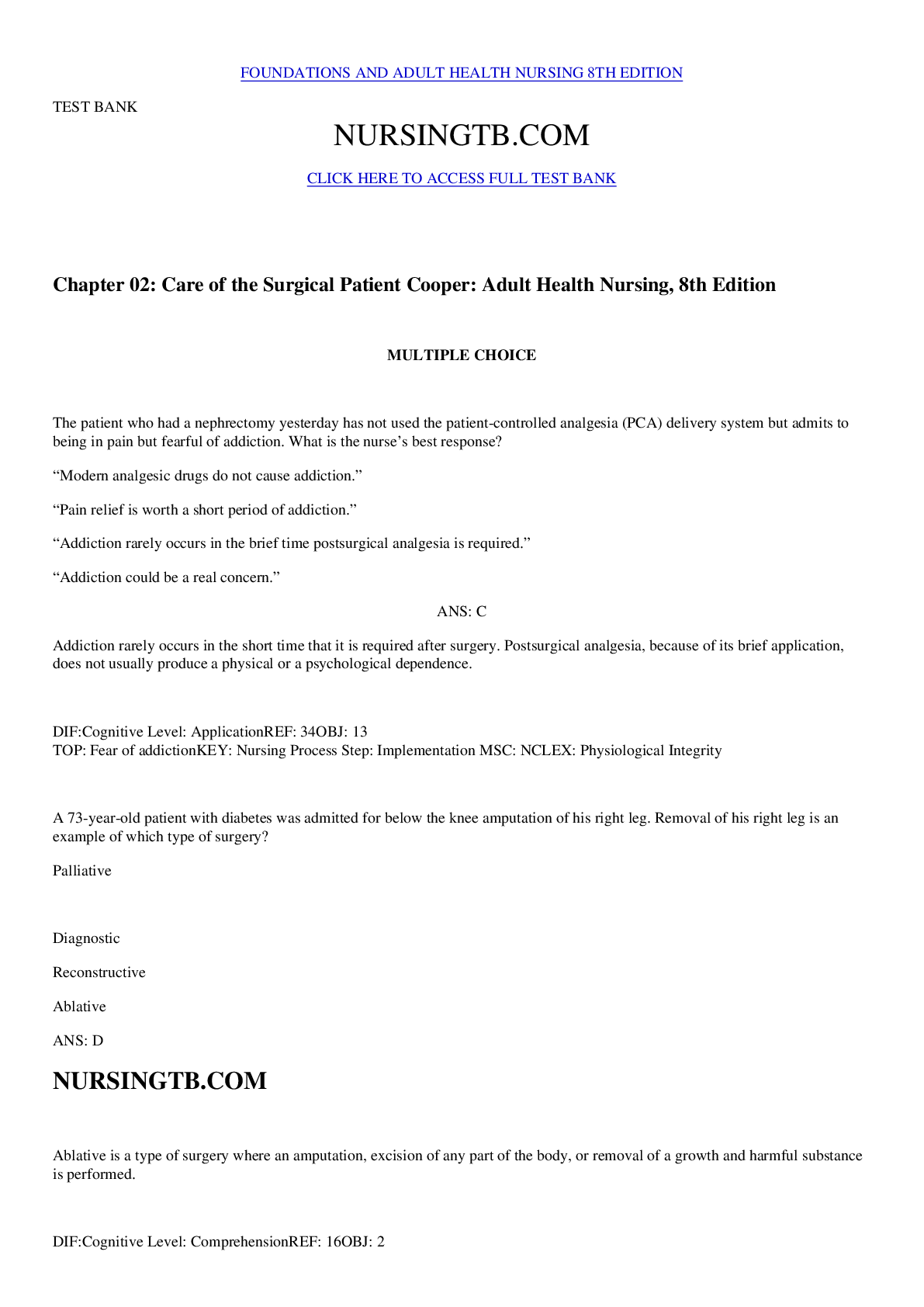
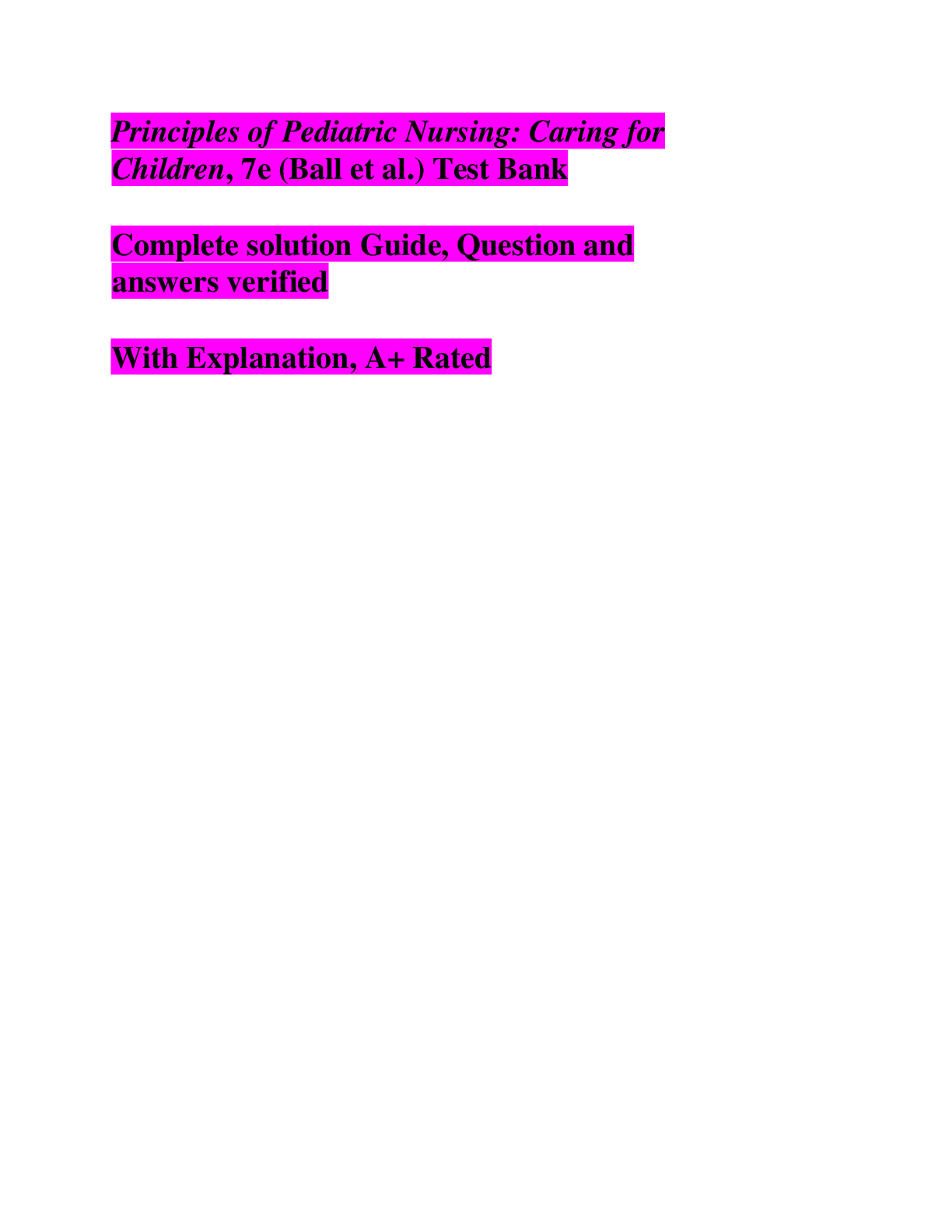
.png)


